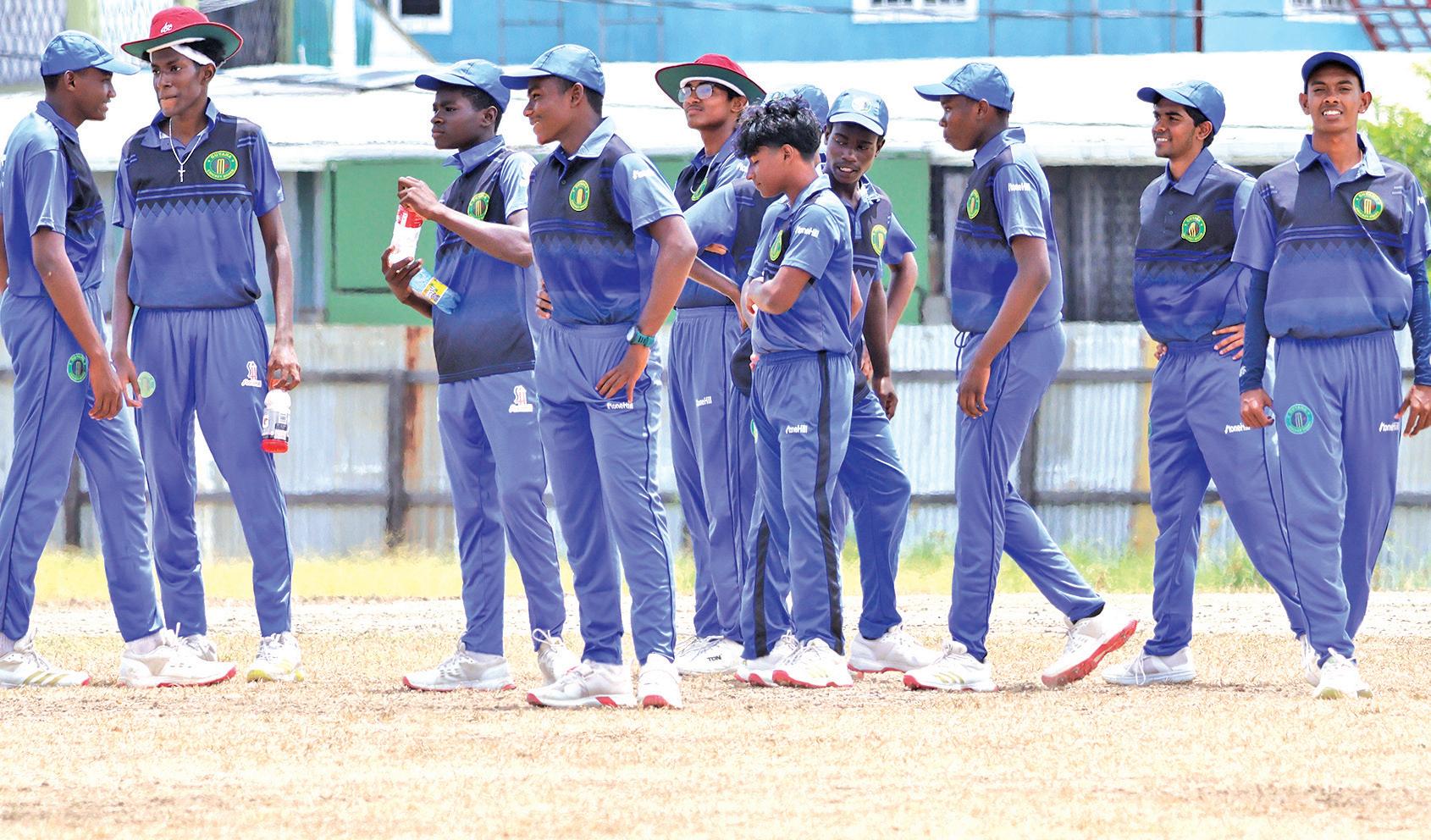




























Guyana is aiming to become an education hub for students in the region, not only when it comes to attracting medical students, but also as it pertains to offering specialised degrees to teachers locally and across the region.
On Tuesday, the Medical Sciences College was commissioned on the grounds of the University of Guyana’s Turkeyen campus. During that ceremony, President Dr Irfaan Ali made it clear that the ceremony was about more than just the building, but rather about Guyana taking its place regionally and internationally.
“We already said education and health will be part of the diversification, and we do it right, we have the certification. Then we can very well be one of the largest international providers of medical education globally. And that is where we want to go. We’re not stopping short,” President Ali said. “This is not compartmental thinking. This is about a huge vision. This is about understanding where we want the country positioned; not only to deliver excellent healthcare to patients, but to be part of research.”
According to President

Ali, the aim of the People’s Progressive Party/Civic (PPP/C) government is to make global medical research part of its economic modelling. He noted that possibilities in this case are endless.
“The possibilities here are enormous. So, for our students, we will be investing in facilities in the different regions. But at the main campus here, we may very well say in the medium-term strategy we will invest, once we get the certification, in a facility for global intake. We already have regional intake,” President Ali said.
According to the Head of State, they will have to be strategic about which areas
to seek to attract additional students in. This means looking at key areas of global manpower shortage, such as the medical field.
“In the medical sciences, almost every area. Pilots in the aviation and marine sectors, not just engineers. Which areas of specialization? What are the target areas? Those are the things we’re working on in the next five years. The medical college now must be able to produce high-quality papers and be part of an international network in which we can punch pound-for- pound, in which we can position us as a leader.”
There is also an oppor-
tunity for the offering of specialized degrees to teachers, not only on a local scale, but on a regional scale…something the Head of State made clear they would seek to harness through the use of technology.
Regionally attractive
“The Minister of Education is already working to see how we can not only train all our teachers, but more importantly, how do we develop a regionally attractive programme to have regional students. That is why the Digital School will be opened up for the region. So that the true integration of the region will be realized
through the Guyana Digital School,” Ali said.
“Because students across the region, on every island, will be studying on the same platform, sharing experiences at the same time, that is the power of integration, and that is what technology enables…we’ve invested in the Teachers Training College and University of Guyana). We want to develop specialized degree programmes for teachers throughout the region. How about we work with our international partners to make this the training ground for all our teachers regionally?”
The Guyana Digital School is a revolutionary online education platform that would ensure students can access quality education regardless of geographical or financial barriers. The initiative was unveiled at the Abram Zuil Secondary School last month. At the time, 2,400 registrants had already been recorded.
This online platform was designed for students in Grades 10 and 11, offering CSEC study materials through a Four-Quadrant Approach that combines technology, interactive learning, engagement, and handson activities. The goal is to

enhance students’ learning experiences beyond the classroom.
The Minister also highlighted that the platform’s content is fully aligned with CXC, which she considers a major achievement.
Beyond traditional coursework, the Digital School would offer supplementary programmes aimed at broadening students’ skills and knowledge. These include entrepreneurial training, cultural studies, electronic nursing, accounting courses, and remedial education in the evenings.
Students can register for the platform at https://www. digitalschool.moe.edu.gy/. So far, 2400 students have registered.



The Demerara Harbour Bridge will be closed to vehicular traffic on:
Thursday, April 3 –21:30h-23:00h and Friday, April 4 – 22:30h-00:00h.
The Berbice Bridge will be closed to vehicular traffic on: Thursday, April 3 –07:15h-08:45h and Friday, April 4 – 08:10h-09:40h.


Parika and Supenaam departure times – 05:00h, 10:00h-12:00h, 16:00h, 18:30h daily.




Thundery to light rain showers are expected throughout the day, with cloudy skies and thundery showers at night. Temperatures are expected to range between 23 degrees Celsius and 29 degrees Celsius.
Winds: North-Easterly to East North-Easterly between 3.13 metres and 4.92 metres.
High Tide: 07:43h and 20:21h reaching maximum heights of 2.55 metres and 2.28 metres.
Low Tide: 13:51h reaching a minimum height of 0.70 metre.










…says Guyana ready to continue advancing shared goals, address global challenges

resident Dr Irfaan Ali has congratulated Hon. Shirley Ayorkor Botchwey on her assumption of office as the 7th Secretary-General of the Commonwealth, and he has assured her of Guyana’s continued cooperation.
In a statement on his social media page, the Head of State said on Wednesday, “I have every confidence that under her leadership, the Commonwealth will continue to be a beacon of unity, progress, and cooperation among its member states. Guyana stands ready to work alongside her to advance our shared goals and address the critical challenges facing our global community.”
Born in Accra, Ghana, Botchwey assumed office as the Commonwealth SG on Monday after being appointed by leaders at the Commonwealth Heads of Government Meeting in Samoa on October 25, 2024. She succeeds Patricia Scotland, whose nine-year term ended in March.
President Ali also used the opportunity to express sincere gratitude to the outgoing Secretary-General, The Rt Hon. Patricia Scotland, for her years of dedicated service.
“Her steadfast leadership and commitment to the values of the Commonwealth have strengthened the organisation and its role in fostering sustainable development and democracy. We sincerely appreciate her contributions and wish her the very best in her future endeavours,” the Guyanese Leader noted.
According to President Ali, Guyana looks forward to continued collaboration
within the Commonwealth for the benefit of all the nations.
Botchwey is former Ghanaian Minister for Foreign Affairs and Regional Integration. She is the first African woman – the second African overall – to lead the association of
affect our pockets directly, increase unemployment and poverty, reduce social protection, and weaken our resilience to shocks.
“The value of our Commonwealth stands in bold relief in a time like this. For over 75 years, the Commonwealth has been a unique and powerful force for good. Now we must seize the moment to realise the transformation our societies seek,” she said.
According to a statement from the Secretariat, the Secretary-General highlighted the power of Commonwealth unity in uncertain times.
“The challenges we face are real and serious,” she said, “but together, we are more than equal to them.” Drawing on Commonwealth values, Secretary-General Shirley Botchwey added,
and opportunities they need to thrive in a rapidly changing world.
Second, the SecretaryGeneral vowed to revitalise trade, investment and connectivity across the Commonwealth, describing it as a pathway to industrial development, productivity and inclusive growth. No country, she stressed, should be left behind, regardless of its size or income level.
Third, calling climate change “the greatest challenge of our time,” she pledged to mobilise stronger action and advocate for reforms of the international financial system to help small and other vulnerable Commonwealth states access the support they need.
The Secretary-General also committed to accelerating the Commonwealth’s modernisation by deliver-
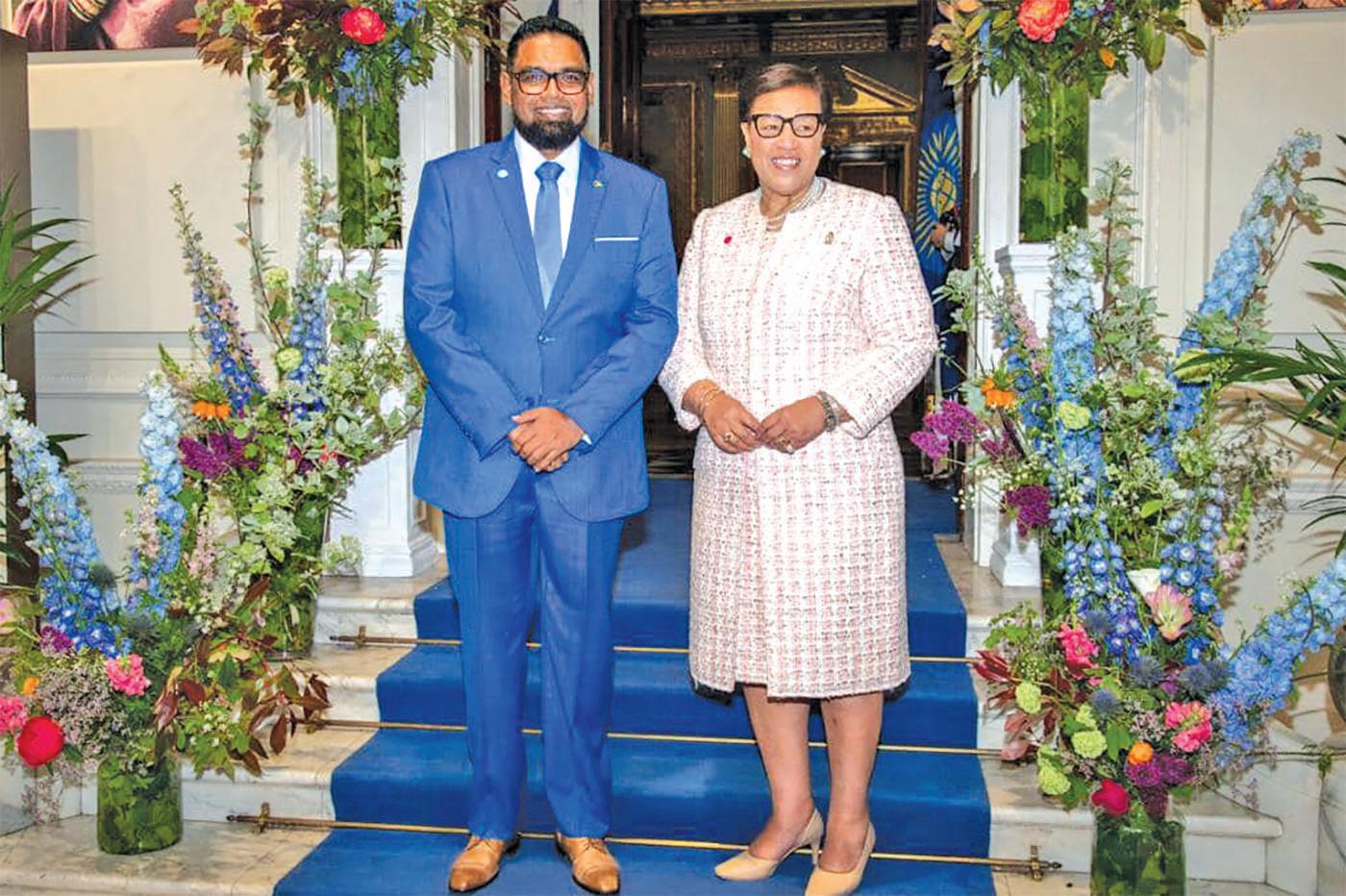
56 countries that make up a third of the world’s population, and more than a quarter of the United Nations membership.
Speaking at the Commonwealth Secretariat’s headquarters in London on April 1, the Secretary-General acknowledged the scale of the challenges confronting the world.
“The world we woke up to today is unlike any we have seen in our lifetimes. The consequences of lower economic growth, increased defence expenditures, and a frayed multilateralism will
“Sustained by the values that bind us – democracy, good governance, peace, human rights, and equal opportunity – we will build a future in which dignity, opportunity, and prosperity are within reach for all.”
A Commonwealth built on all talents
The Secretary-General further outlined three strategic priorities for her leadership, calling them the foundation for a “Commonwealth built on all talents”.
First, she pledged to equip women and young people with the skills, tools
ing faster and smarter partnerships to meet the needs of all its people.
Reflecting on her own historic journey, she said, “It is a great honour to be the first African woman to serve as Secretary-General. No matter where in the Commonwealth you come from, this path is open to you.”
The Secretary-General concluded her address with a message of shared resolve, adding, “Let’s move forward with purpose, with courage, and with an unshakable commitment to a Commonwealth that truly thrives together.”



Editor: Tusika Martin
News Hotline: 231-8063Editorial: 231-0544, 223-7230, 223-7231, 225-7761
Marketing: 231-8064Accounts: 225-6707
Mailing address: Queens Atlantic Industrial Estate Industrial Site, Ruimveldt, Georgetown
Email: news@guyanatimesgy.com, marketing@guyanatimesgy.com
The Education Ministry’s launch of the Guyana National TVET Policy 2025-2035 marks a defining moment in the country’s course towards a more skilled, competent, and future-ready workforce. This 10-year framework is aimed at modernising the technical and vocational education and training (TVET) landscape to meet the demands of a rapidly-evolving economy.
Education Minister Priya Manickchand has articulated the rationale behind this policy, emphasising its role as a guiding document for all stakeholders involved in skills training. The absence of a unified framework for TVET in Guyana has long posed a challenge, leaving various ministries and institutions to operate in silos. By integrating the efforts of the Ministries of Education, Labour, and Human Services, alongside the University of Guyana, Cyril Potter College of Education, and other relevant bodies, the policy ensures a coordinated and comprehensive approach to technical education. This unified vision is essential in fostering a workforce that is both locally relevant and globally competitive.
The necessity of this policy cannot be overstated. Guyana is experiencing an economic transformation, particularly with the advent of its burgeoning oil and gas sector and other industrial expansions. However, a persistent challenge remains: a shortage of skilled professionals. Minister Manickchand highlighted the Government’s ongoing struggle to find qualified engineers, technicians, and apprentices to maintain critical infrastructure, including schools. The stark reality is that the country may have to import labour if immediate and strategic steps are not taken to cultivate homegrown expertise. This policy, therefore, arrives at a critical juncture, serving as a blueprint for producing a competent workforce that meets national and regional demands.
A key strength of the TVET policy is its alignment with the CANTA Quality Assurance Framework, enhancing the mobility and certification recognition of TVET graduates beyond Guyana’s borders. By ensuring that training meets international standards, the Government is not only preparing youth for domestic employment but also positioning them for opportunities across the Caribbean and beyond. This strategic foresight is crucial in a globalised world where workforce mobility is an asset.
One of the critical weaknesses of Guyana’s current TVET system is the lack of a single coordinating agency to oversee technical education. This has resulted in fragmented implementation and varying governance structures across Ministries and agencies. The new policy seeks to rectify this by promoting a cohesive structure that will streamline efforts and eliminate inefficiencies. Additionally, the establishment of a TVET levy in consultation with the Private Sector represents a forward-thinking approach to funding technical education. By involving businesses in shaping TVET curricula and investing in training, the policy fosters a symbiotic relationship between industry and education.
It is important to recognise that this policy is not being implemented in a vacuum. Its foundation is built upon legislative frameworks established through the passage of the Technical and Vocational Education and Training Act (Act No 11 of 2004) and the National Accreditation Act (Act No 12 of 2004). These acts paved the way for the formation of the Council for TVET (CTVET), which has played a pivotal role in advancing technical education. The new policy enhances these efforts by ensuring a more structured, strategic, and responsive TVET ecosystem.
As Guyana embarks on this decade-long journey, the success of the National TVET Policy 2025-2035 will depend on effective implementation, continuous monitoring, and adaptability to changing economic conditions. Stakeholders—including Government agencies, educators, businesses, and civil society— must collaborate to ensure that this policy does not remain a mere document but translates into tangible improvements in the lives of citizens.
The future of Guyana’s workforce depends on the actions taken today. By investing in technical and vocational education, the nation is not only addressing immediate labour shortages but also equipping its youth with the skills and knowledge needed to thrive in an increasingly-competitive world. This policy is a step in the right direction, signalling a commitment to sustainable growth, economic resilience, and national progress. It is now up to all stakeholders to embrace this vision and work collectively to transform Guyana into a hub of technical excellence and innovation.

Dear Editor,
Several writers have claimed that there has been an erosion of democracy in Guyana, particularly during the PPPC’s current term in office (2020-2025). The Guyana Press Association (GPA) alleges, for example, that freedom of expression under the PPPC administration is being threatened.
The PPPC believe that much of the criticism has emerged because they (PPPC) have been refuting “fake” or distorted news. Any government, including the PPPC, has the right to challenge distorted news or misinformation, and such responses must not be construed as attempts to discredit the press.
The critics’ case is buttressed by reports of Transparency Institute of Guyana (TIGI), whose findings, however, are disputed by the PPPC government. TIGI awarded Guyana a low score of 39 on the 2024 Corruption Perception Index (CPI). This is below the regional average of 42, and it ranks Guyana 92 out of 180 countries. TIGI notes: “In Guyana, state capture by economic and political elites fosters misappropriation of resources, illicit enrichment, and environmental crime…transparency and law enforcement are very low, and attacks on dissenting voices, activists, and journalists increasingly
common.”
The PPPC reject these findings, and say that they are not based on any credible evidence.
Another source of support for the critics’ position on erosion of democracy is an organization called the V-Dem Institute. Mr. Edward Burrowes says that Guyana has been moving, since 2018, towards “autocratization” (a political situation in which power is highly concentrated in one person, who also suppresses dissent). Based on his interpretation of the findings of the V-Dem Institute, he accuses the PPPC government of “trying to stifle the emergence of 3rd parties and freedom of expression.”
Had Mr Burrowes conducted a critical review of V-Dem's methodology, he would have recognized why Guyana received lower scores on 3 of the 6 metrics: Egalitarian Components, Participatory Components, Deliberative Components (The other three are Liberal Democracy, Electoral Democracy, Liberal Components). Although quantitative and qualitative data show that Guyana has outperformed most Caricom states in at least three of the 6 metrics (‘Egalitarian’, ‘Participatory’ and ‘Deliberative’ Components), it still received lower scores than the other electoral democracies.
There is an abundance of data over the past 4 years (2020-2024) on how the PPPC government has revolutionized the democratic process by taking government to the people on a weekly basis to every village in every region of the country.
The PPPC solicit citizens’ views on development of their manifesto as well as on development priorities for their communities. These initiatives are reflected in the egalitarian, deliberative and participatory components of Guyana’s electoral democracy, yet Guyana has been scored below countries which it outperformed on these metrics!
Therefore, to understand why Guyana received lower scores than other Caricom states, one must know how the six metrics are computed and rated by the 30 experts (20 local and 12 overseas).
We asked V-Dem to name the local experts, but they declined: “We do not reveal the identity of our Country Experts, and preserve Country Expert confidentiality according to a strict policy.”
In the interest of transparency, accountability, and good governance, shouldn’t Guyanese know the names of the local “experts”? We need to know what data they provide to V-Dem. Have they ever pro-
vided any IMF or World Bank data on Guyana’s favourable economic performance?
Economic prosperity could only flow from a good democratic foundation, including freedom of expression. The IMF (March 2025 report) highlights various positive economic indicators, such as an average GDP growth rate of 47% between 2022-2024; a projection of growth rate of an average of 14% for the next 5 years; while the non-oil sector would grow on average by 6.75% during the same period. The fiscal budget deficit would narrow from 7.3% of GDP in 2024 to 5% of GDP in 2025. Shouldn't we know if any favourable data on Guyana has been sourced by V-Dem and other organizations, like TIGI? While we condemn corruption, any form of criminal activity, and sluggish law enforcement, we do not find in Guyana any verifiable evidence that the PPPC government is suppressing freedom of expression, an essential foundational principle of democracy. Instead, what stifles freedom of expression and democracy is “fake” news, misinformation, and the extant Defamation Act and the 2018 Cybercrime Act. Just think about it!
Sincerely,
Dr Tara Singh


Dawantie
Thackurdeen, a 24-year-old female of Richmond Hill in Linden, was arrested on Monday, March 31, after police found 1.190 kg of marijuana at a shop she runs at Eight Miles Backdam in Port Kaituma, North West District, Region One.
Ranks from Regional Police Division 1 were at the time conducting an anti-crime patrol within the Port Kaituma Police Station district when they received certain information and proceeded to a shop at Eight Miles Backdam.
The ranks met Dawantie at the shop, and enquired

who the shop owner was. She indicated that it was a man called 'Wicked Tail', who was in Georgetown. Daywantie told the ranks she was the shopkeeper.
Police then told her of the information received and of their intention to conduct a search of the shop for anything illegal, such as narcotics, arms and ammunition. She was asked if she had anything illegal to declare before the search, and she said, “Yes, sir.”

In addition, he has been charged with escape from lawful custody, having escaped from the Mabaruma Police Station on February 11, 2025.
RFurther searches were conducted, but nothing else illegal was found.
Dawantie Thackurdeen was told of the offence committed and was cautioned. She replied, "This is all I get. A man bring this last night. The boss sent it."
She was arrested and escorted to the Port Kaituma Police Station along with the cannabis, which was weighed in her presence and amounted to 1.190kg. She is in custody assisting with Investigations.
She then took the ranks into the shop area, where she took out two bulky plastic bags from under the counter, each containing a quantity of leaves, seeds and stems suspected to be cannabis. The bags also contained a quantity of what appeared to be compressed marijuana.
ichard Domingo, a 39-year-old chainsaw operator of White Water in the North West District of Region 1, was arrested on March 30, and charged on Wednesday, April 2 for rape, sexual activity with a child family member, and escape from lawful custody.
Domingo has been charged with rape committed on a 25-year-old female, which is reported to have occurred between November 1, 2016 and November 30, 2017 in Region 1. He has also been charged for engaging in sexual activity with
Dear Editor,
Recently, President Irfaan Ali's government made the important decision to lift tolls on select bridge crossings. While public discourse has largely focused on the potential revenue loss from eliminating toll collection, it's essential to highlight the positive impacts this decision will have on Guyanese households and small businesses.
Removing tolls directly reduces costs for families, and lowers operational expenses for small businesses such as minibuses. This is particularly significant in the context of rising inflation, as it alleviates the financial burden on consumers. By eliminating tolls, Government is effectively putting more income back into the hands of Guyanese families; thereby increasing disposable income, especially for lower and middle-income households, who are often most affected by eco-
nomic challenges.
With additional funds from toll removal, families can choose to either spend more or save more, offering a critical economic boost.
Traditionally, tolls have funded infrastructure projects, but Government has identified alternative funding sources, such as the Natural Resources Fund, to sustain these initiatives. By diversifying funding, the Government can continue essential infrastructure investment without relying solely on toll revenue.
To illustrate the economic implications of lifting tolls, consider the Berbice River Bridge, where the toll is approximately Gy$1,000 (around US$5) for cars and between Gy$2,000 and Gy$3,000 (about US$10 and US$15) for larger vehicles.
Removing this toll could result in savings of approximately Gy$2,000 per month for households. These savings can reduce transpor-
tation costs significantly, encouraging further investments by small businesses in various sectors.
Moreover, abolishing tolls can contribute to addressing the ongoing issue of inflation. The International Monetary Fund has recently projected that inflation in Guyana could reach around 4 percent by the end of 2025. By lowering transportation costs, Government can help stabilise prices across sectors, particularly those reliant on bridge crossings for the movement of goods and services.
Reduced tolls can lead to decreased operational costs for businesses, which may, in turn, result in lower prices for consumers.
This policy decision underscores Government’s commitment to enhancing the quality of life of its citizens, by making daily commutes more affordable and promoting increased economic activity and mobility.
Additionally, it reflects a broader commitment to inclusive economic policies that prioritise the wellbeing of the population over mere revenue generation.
In the long term, by investing in sustainable infrastructure improvements and redirecting funding from tolls to more stable revenue sources — such as tourism, agriculture, or enhanced public transport systems — Government can more effectively tackle immediate and future economic challenges.
While fiscal implications of lifting tolls are significant, the potential benefits to Guyanese households and the overall impact on inflation should not be underestimated. This policy represents a crucial step towards fostering a more equitable and resilient economic environment in Guyana.
Sincerely,
Dr Tilokie Arnold Depoo
a child family member, allegedly committed between August 1, 2012 and August 30, 2013 in Region 1.
Domingo appeared via Zoom before Mabaruma Magistrate Clive Nurse on Wednesday, and was not required to plead to the offences for which he has been charged. However, he pleaded guilty to the offence of escaping from lawful custody and was sentenced to 12 months' imprisonment. He has been remanded to prison for the other offences for which he has been charged, and the cases have been adjourned to 20th May 2025.


THURSDAY, APRIL 3, 2025
00:00 Sign Off 06:00 Navratri Devotional Hour 07:00 Evening News (RB) 08:00 BBC Travel Show
08:30 HGTV 10:00 Stop Suffering 11:30 Food Network 12:00 News Break 12:05 Movie - Mowgli: Legend of the Jungle (2018) 14:05 Wheel of Fortune 14:30 The Fiarly Oddparents 15:00 When Calls the Heart S9 E4 16:00 Indian Soaps 17:00 The Young & The Restless 18:00 Aljazeera 19:00 The Evening News
Stop Suffering
Stand-up Comedy
Grey's Anatomy S7 E4
The Recruit S1 E2
Little America S1 E6
Arrested Development S2 E10


1. 24 is not a multiple of (A) 3
(B) 4
(C) 6
(D) 7
2. Which of the following pairs of numbers gives a sum that is prime and a product that is composite?
(A) 2 and 9 (B) 3 and 7
(C) 4 and 8
(D) 5 and 5
3. What is the place value of 8 in this number 8200?
(A) tens (B) thousands (C) hundreds (D) ones
4. When rounded off to the nearest hundred dollar, John’s daily allowance is $200. Which of the following amounts is most likely the actual allowance?
(A) $189
(B) $180
(C) $183
(D) $181
5. If 278 + X = 3204, then X represents the number
(A) 2926
(B) 692
(C) 3466
(D) 3664


6. If a bottle of water cost 3/5 that of a juice at $120, how much would both cost?
(A) $400 (B) $320 (C) $250 (D) $600
7. Calculate 3x18+1-2 (5-4) (A) 53 (B) 54 (C) 55 (D) 56
8. The diagram EFGH, shown below, is a square with a straight line connecting the vertex E to the point J. Angle FEJ = 49°.

Find the value of (i) Angle x (ii) Angle r


By Wilfred OWen
Bent double, like old beggars under sacks, Knock-kneed, coughing like hags, we cursed through sludge, Till on the haunting flares we turned our backs, And towards our distant rest began to trudge. Men marched asleep. Many had lost their boots, But limped on, blood-shod. All went lame; all blind; Drunk with fatigue; deaf even to the hoots Of gas-shells dropping softly behind. Gas! GAS! Quick, boys!—An ecstasy of fumbling Fitting the clumsy helmets just in time, But someone still was yelling out and stumbling And flound’ring like a man in fire or lime.— Dim through the misty panes and thick green light, As under a green sea, I saw him drowning. In all my dreams before my helpless sight, He plunges at me, guttering, choking, drowning. If in some smothering dreams, you too could pace Behind the wagon that we flung him in, And watch the white eyes writhing in his face, 16 His hanging face, like a devil’s sick of sin; If you could hear, at every jolt, the blood Come gargling from the froth-corrupted lungs, Obscene as cancer, bitter as the cud Of vile, incurable sores on innocent tongues— My friend, you would not tell with such high zest To children ardent for some desperate glory, The old Lie: Dulce et decorum est Pro patria mori.

Questions 1. Summarise the poem
2. What type of poem is it?
3. Describe the tone, mood, atmosphere, and persona
4. List two examples of imagery, metaphor/simile and all the figures of speech found in the poem
5. Describe how the poem makes you feel
6. Suggest an alternative title for the poem and state why it is appropriate


The Guyana Government and the World Bank on Tuesday signed a US$22 million agreement for the ‘One Health’ project, which will see the bank supporting Guyana in improving its capacity to respond effectively to health emergencies and provide funding for a range of initiatives, from enhanced laboratories to greater monitoring at the borders.
According to a statement from the Ministry of Finance, the funding is comprised of a US$15 million grant from the Pandemic Fund, a facility set up by the World Bank to help countries boost their preparedness for pandemics such as the COVID-19 pandemic a few years ago, and a US$7 million loan, also from the World Bank.
Present at the signing were Finance Minister Dr. Ashni Singh, World Bank’s Resident Representative

America and
In
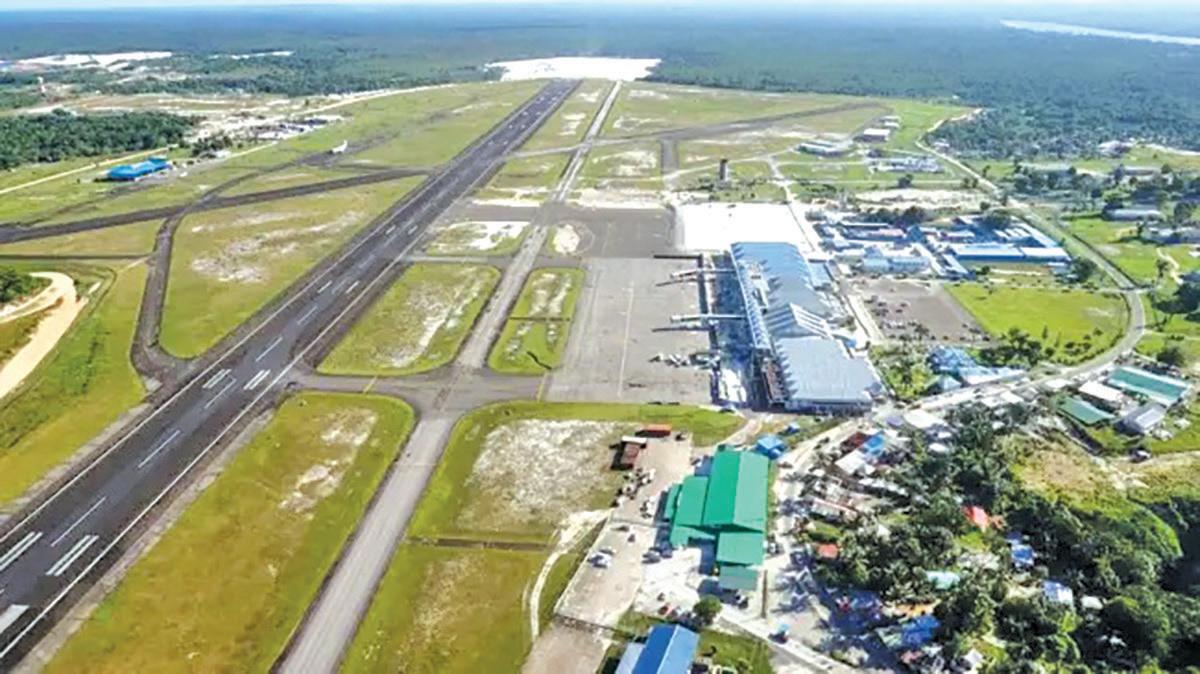
Disaster nearly occurred on Monday evening at the Cheddi Jagan International Airport (CJIA) at Timehri after two aircraft, a Roraima Airways Britten Norman Islander and a Trinidadbased Caribbean Airlines Limited (CAL) aircraft, ended up on the runway at the same time.
The runway incursion, which occurred at about 23:14h, has resulted in at least three pilots and an Air Traffic Controller (ATC) being suspended, and an investigation has been launched into what the Director General of the Guyana Civil Aviation Authority (GCAA),

Director General of GCAA, Lt Col (Retired) Egbert Field
Retired Lt. Col. Egbert Field, said was a “dangerous situation”.
More than one aircraft is not allowed on the run-
way at the time same time, especially if both are still operating; that is, landing or taking off.
Saavedra reaffirmed the bank’s commitment to supporting the Government’s development drive. Further, Saavedra noted that the project reflects the strong commitment of the Government of Guyana itself to revolutionize its healthcare system. The Director went on to urge other countries to take heed of the example being set by Guyana on both the regional and global stages.
“This phrase of One Health puts together this interconnectedness between human, animal and environmental health, and it reminds us that a threat to one of them eventually results in a threat to all. I think this is strong leadership of the country to bring together public health on one hand, veterinary science on the other, and environmental management or everything at the same time; (it) sets a very strong example,” Saavedra said.
That very Tuesday, Saavedra also participated in the ribbon cutting of a US$4.576 million Medical Sciences College that was partially funded by the World Bank and built on the University of Guyana’s (UG) Turkeyen campus. At that ceremony, he also reaffirmed the bank’s commitment to Guyana and noted the importance of the bank’s support for health and education.
“The World Bank remains steadfast in its commitment to supporting the Government of Guyana’s mission to deliver world class education that meets current needs and anticipates fair challenges. The stakes could not be higher. The doctors we train today will shape healthcare for decades to come. But today, a new chapter in the medical history of Guyana is beginning.
“A new chapter that will not only allow a great university to be effective in educating future health professionals, but will allow the citizens of this country to be more prosperous, healthier and happier,” Saavedra had said.
Historic
Meanwhile, Dr. Singh, at the US$22 million loan signing, described the event as a historic one, coming on the heels of the COVID-19 pandemic that the PPP/C government developed a pandemic response to in its first year of office.
At the time, Guyana had been going through a crisis of democracy caused by the former A Partnership for National Unity/Alliance For Change (APNU/AFC) government’s decision to squat in office for five months after losing the elections.
According to the
Finance Minister, Guyana was woefully unprepared at the time for a pandemic, yet rose to the challenge under the Dr. Ali led government. As a matter of fact, so exemplary was Guyana’s navigation of the crisis that it earned Guyana an invitation to serve on the board of the Pandemic Fund.
“The Guyana example has been cited on multiple occasions, and the project checks every box. For example, the project illustrates the use of World Bank/ IDA resources to leverage additional resources, such as the grant now received from the Pandemic Fund. Additionally, it is a project that is fully aligned with national priorities, addressing actions that emerged from the Government’s Action Plan for pandemic preparedness,” Dr. Singh further explained.
Also present at the signing was Minister of Health Dr. Frank Anthony, who remarked on the Government’s close collaboration with the World Bank during the Covid-19 pandemic. He also recognized the need for Guyana to adequately prepare itself for future pandemics, and expressed appreciation for the bank.
The One Health Project is an initiative aimed at strengthening Guyana’s capacities to prevent, prepare for, and respond to health emergencies through a One Health approach. It includes capacity building for laboratories and human resources; strengthening health surveillance, including at the border; strengthening One Health coordination and capacity; a rapid data driven health surveillance system and a strengthened public health workforce.



Ja 40-year-old truck driver of Section 'B', Block 'X', Diamond Housing Scheme, East Bank
the
ridor on Wednesday. He is presently in custody as the Providence Police Station, and is slated to be charged
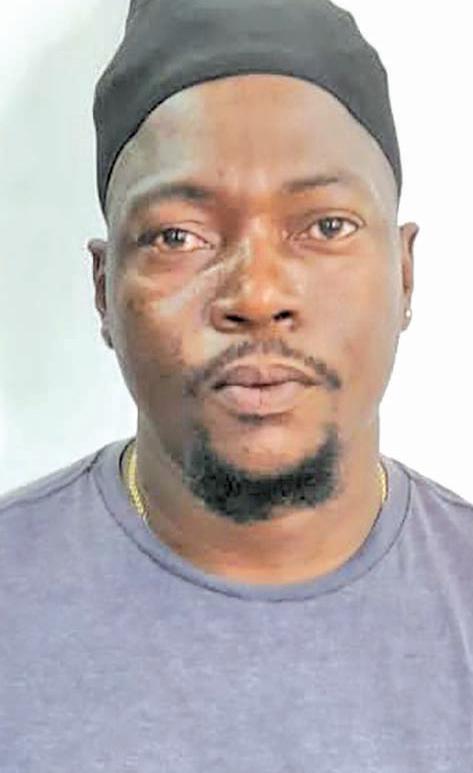
soon.
Police have said that residents have been complaining that truck operators habitually dump waste material along the parapets in that area with impunity.
While there was no physical contact between the two aircraft and no damages or injuries were recorded, Field explained to the Guyana Times on Wednesday that the licences of the local pilot and the air traffic controller were suspended in accordance with the standard procedures.
“Once there is an incident, all parties involved in that incident are suspended until we get a preliminary report or if the investigating party thinks the suspension of an individual or individuals could be lifted because you don’t want to suspend people and then they are completely innocent,” Field to the Guyana Times on Wednesday.
According to the GCAA Director General, he informed his counterpart in Trinidad and Tobago about the incident and similar actions were taken against the CAL pilots. “I was informed that they too are suspended as is standard procedure for any [aviation] incident.”
Meanwhile, the GCAA Head would only say the preliminary report would be ready “very shortly” but could not give a timeline.
He, nevertheless, assured that the suspension would be lifted once no culpability is found on the individuals involved.
This newspaper understands that the Roraimaowned aircraft had landed at the CJIA and was still on the runway when the Caribbean Airlines aircraft, a Boeing 737 Max, was also given clearance to land.
Based on reports, the CAL aircraft had to break at a jolt to avoid a collision with the smaller aircraft.
CJIA in a statement said that “Preliminary information indicates a Roraima Airways aircraft was turning off the main runway then appears to have changed its direction resulting in both the Roraima Aircraft and Caribbean Airlines being on the runway at the same time.”
The probe will ascertain how and why this runway incursion occurred and investigating team will make the necessary recommendations on the penalties and/or actions to be taken against anyone found culpable.
This incident comes as the CJIA has seen an increase in daily flight with

more regional and international airlines expanding operations here. Simultaneously, the local aviation industry is also facing a situation whereby it is losing workers, including ATC, to the oil and gas sector.
In 2024, Guyana Times had reported that 20 Air Traffic Services staff had resigned, with nine resignations associated with Air Traffic Services for the period January to December 2023, comprising seven Air Traffic Controllers and two AIS/AIM officers.
The GCAA had said based on the exit interviews, three employees had related that “better opportunities” was their reason for leaving, while the other six had referenced non-fi -
nancial reasons.
Just last year, Guyana’s Civil Aviation Training School was accredited by the International Civil Aviation Organization (ICAO).
Principal of the Guyana Civil Aviation Training School (CATS) Clifford Van Doimen told this publication earlier this month that the shortage of Air Traffic Controllers has been a decades long issue not just here but around the world.
According to Van Doimen, Guyana only started to arrest this issue between 2014 to maybe 2018. The most recent intake of Air Traffic Controllers comprised some 25 persons from across Guyana.
Marlon Jones, a 46-year-old resident of Lot 2 Queenstown, Essequibo Coast, Region Two (Pomeroon-Supenaam), has been fined and disqualified from driving for a year after pleading guilty to operating a motor vehicle along the Aberdeen Public Road on the Essequibo Coast on March 26 while his breath exceeded the legal limit of alcohol.
Charged under Section 39(A) (1) of the Motor Vehicles and Road Traffic Act, Chapter 51:02, as amended by the Motor Vehicle and Road Traffic Amendment Act 17/2022, Jones appeared before Suddie Magistrate Tamieka Clarke on Tuesday and pleaded guilty as charged. He has consequently

been fined $200,000, with a default penalty of three months' imprisonment if the fine is not paid; and he has been disqualified from driving and prohibited from obtaining a driver’s licence for a period of 12 months.

In all the ‘tempest in a teacup’ about a coalition between the Opposition parties to “remove the PPP from office”, it looks like the micro “parties” – which helped the PNC convince a gullible few that the PNC had disappeared into APNU – have disappeared into thin air!!
It would seem that things have never been the same after they kept on inviting Aubrey Norton to meetings –after General Secty “Lil Joe” Harmon had decamped, along with the Sanctimonious Gangster, subsequent to their being booted out from the PNC leadership - and he never showed up.
So, last June, Keith Scott of the National Front Alliance (NFA); Vincent Henry of the Guyana Action Party (GAP); Jaipaul Sharma, Leader of the Equal Rights and Justice Party (ERJP); and Tabitha Sarabo-Halley, Leader of the Guyana Nation Builders (GNB), duly gathered and elected Vincent Henry as the Chairman of APNU. Norton went ballistic, and immediately pointed out that, with no APNU Gen Secty, the meeting had no standing, and its actions were irrelevant – and he was still Chairman of APNU!!
Lo and behold, six months later, it was announced that the APNU execs had met at Congress Place under the chairmanship of Norton, and they were gonna pursue coalition politics for the upcoming elections. Norton had obviously heeded the African proverb that says, “A wise old man only gives his walking stick to someone from whom he can take it back”!!
That Sarabo-Halley and Jaipaul Sharma were absent from this conclave suggests they might’ve been behind the palace coup to oust Norton, and they weren’t getting no walking sticks!! But this brings us back to the point your Eyewitness raised at the beginning – especially now that we know coalition-building was the raison d’etre for their kiss-and-make-up January meet!!
So, what does this tell us about the state of play between Norton’s PNC and Hughes’s AFC in their hold-meloose-me coalition “negotiations”?? Clearly, that Norton goes by the other party’s willingness to accept that he’s Numero Uno before he starts handing out walking sticks!! And the AFC – for reasons that your Eyewitness can’t really fathom - made it clear from the word go that Norton ain’t even being considered for Number TWO!! They even suggested a wildcard with absolutely NO political background save being Coloured to rub in Norton’s cultural background!!
Now, why in the world did they ever think Norton would go for that?? For the greater good – which the AFC couldn’t seriously consider they could deliver, unless they were smoking some serious crack??!!
So, it would appear that Norton’s gonna lead the PNCas-APNU against the PPP come this November-at-latest elections!! If for nothing else, he’s gonna show Guyana “goat ent bite ‘e”!!
…to enjoying peace??
You’d think that, with almost sixty years of governing ourselves as an independent nation, we’d start enjoying the stability that was promised by going democratic. But here we are, still buffeted by conflicts that used to play out in street-corner cuss-outs; but we’re now torn apart over social media platforms, and ever so often we erupt into violence. Where the heck did we go wrong??
Forget all the theory about democratic peace; there’s our own post-independence EXPERIENCE, for which we couldn’t throw the blame on the Brits!! Did the riots of the sixties lead to progress? Did the killings of the early 2000s and all that happened in between, like the “kick down the door” banditry, do any better?
One of the reasons offered is that we were so po’ we had to be fighting to get a morsel. But we now got enough money – even with our 14.5% of the oil revenues – to soon give more than a morsel to everyone. So, could we simmer down?
…to western consensus??
While most folks are all agog over the claimed fissures in the western alliance that’s held for over eighty years, could it be that the US is letting Europe contain Russiawhile they pivot and focus on China?


The surprise inclusion of Guyana on a list of countries facing reciprocal tariffs from the United States (US), a measure that, if implemented, could see the cost of doing business increase, has resulted in the Government of Guyana reaching out to its partners in the US, seeking answers.
On Wednesday, US President Donald Trump announced Global Reciprocal Tariffs that will be implemented against a number of countries on all goods that the United States imports. Guyana is among several Caribbean and South American countries on the list.

According to a chart the US President read from, Guyana will have a 38 per cent reciprocal tariff rate applied to its exports to the US, in response to the 76 per
cent tariff that Guyana was listed as imposing on US products.
In an invited comment, Senior Minister in the Office of the President with re-

sponsibility for Finance, Dr. Ashni Singh, indicated that they are in contact with their American partners on the issue.
“The Government of Guyana has taken note of the reciprocal tariffs announced by the US Government earlier today. Our government is closely engaged with our US partners to better understand the issue and have it addressed as appropriate,” Dr Singh said.
Tariffs are a tax imposed by the government on imported goods from other countries. They are usually aimed at promoting and safeguarding domestic industries in the country do-

ing the importing by limiting the proliferation of foreign goods on their domestic market.
Since President Trump took office earlier this year, tariffs have been a trending issue. This was especially so in the Caribbean when the US Government announced last month that tariffs would be imposed on China-made ships/vessels, a measure which would impact trade in Guyana and the Caribbean Community (CARICOM) region.
Based on a previous BBC report, President Trump had said that he was planning “reciprocal tariffs” on various nations as he aims to reshape the US’ global trade relationships.
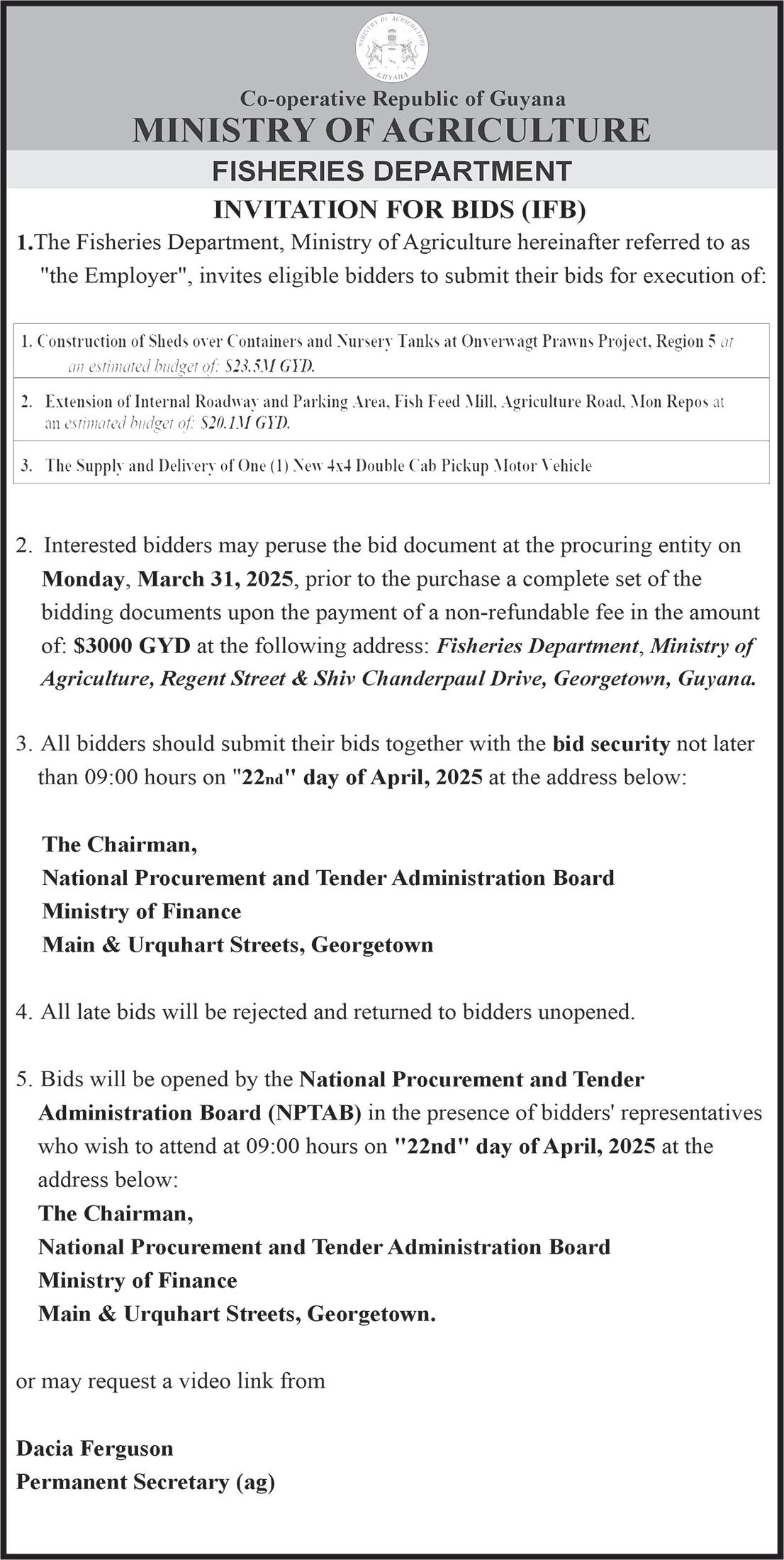


Police are investigating a fatal accident that claimed the life of 25-year-old motorcyclist
Joshua Ross on Tuesday. Reports are that the accident occurred at about 20:00h at the intersection

of Amelia’s Ward Public Road and Toucan Drive in Linden, Region 10 (Upper Demerara-Berbice).
Police have said the accident involved motorcar PXX 4611, owned and driven by 69-yearold pensioner Juliet Alexander, and motorcycle CN 6284, owned and ridden by Joshua Ross, an unemployed resident of Industrial Area in Linden, who succumbed to his injuries.
According to police reports, the motorcar was travelling north along the western drive lane of Toucan Drive while the motorcycle was proceeding east along Amelia’s Ward
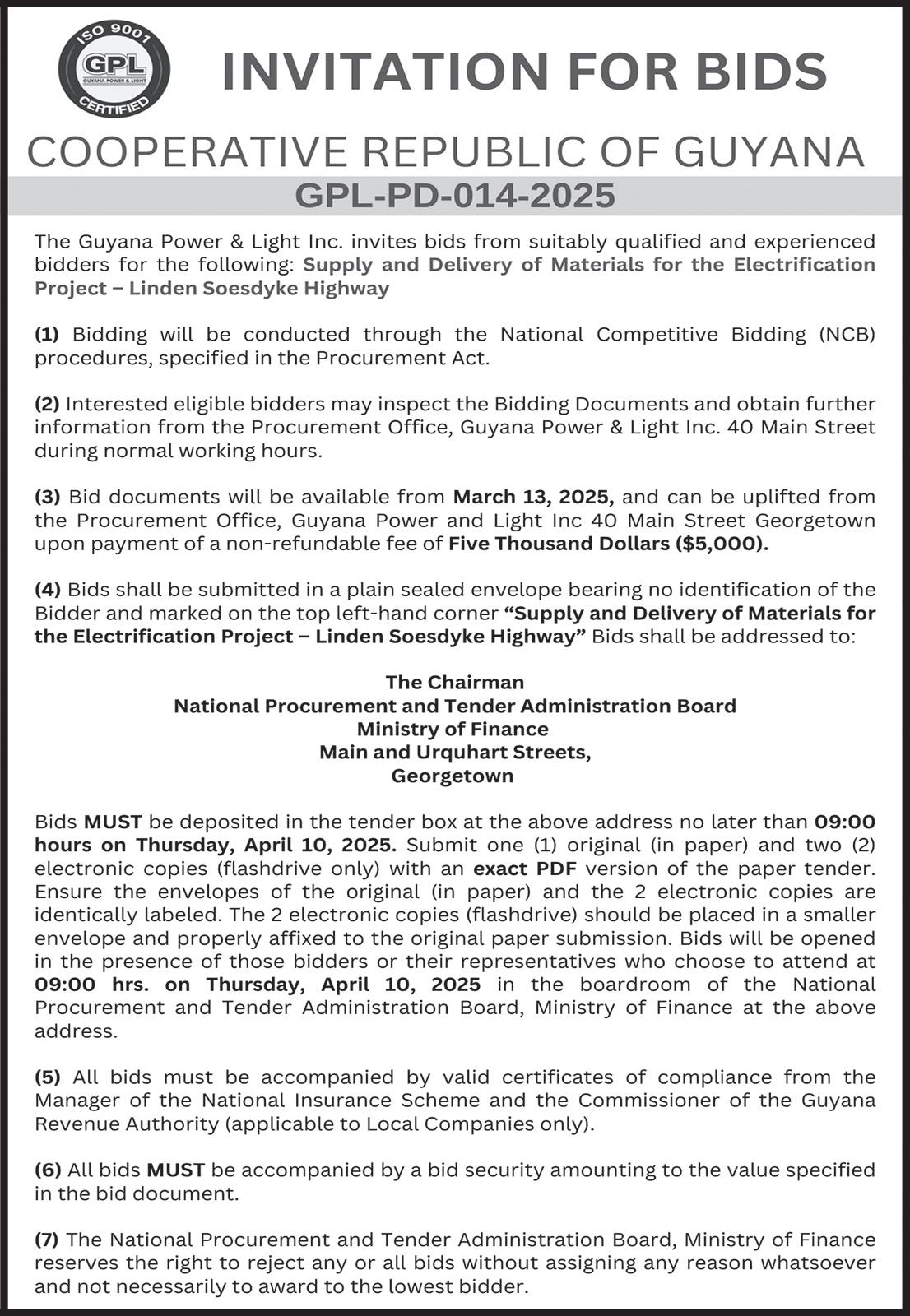
Public Road at a high speed in a zig-zag manner. The motorcyclist was not wearing a safety helmet, and was riding with his motorcycle lights off.
As both vehicles approached the intersection, the car came to a stop before attempting to cross the public road, but the motorcycle collided with the front left side of the car, and Ross was flung several feet from the point of impact. He landed on the northern parapet, and there were severe injuries about his body.
Public-spirited citizens who rushed to assist transported the injured motorcyclist to the Linden Hospital Complex. However, he was pronounced dead on arrival. His body was later taken to the Linden Senior Citizens Association Funeral Home’s Mortuary, where it awaits a post-mortem examination.
The police have since impounded both the car and the motorcycle for examination. Driver of motorcar PXX 4611 remains in custody, assisting with investigations.
The US President, the article stated, did not say which countries could be targeted but suggested it would be a broad effort that may also help solve US budget problems.
The Guyana Government has already been engaging the US to ensure that trade relations remain favourable not just between the two countries but the wider Caribbean region. As far back as February, this position had been articulated by Vice President Dr Bharrat Jagdeo, amid plans by the US Government to impose tariffs on imports from several countries including Canada, Mexico and China.
In light of this potential tightening of global trade, Jagdeo had told reporters at one of his press conferences that the Government is paying attention to the issue, which could see the potential tightening of global trade.
While the US Government had gone ahead with its implementation of a 10 per cent tariff on imports from China, there had been a 30-day delay on the 25 per cent tariff to be imposed on imports from Canada and Mexico. This latter move had brought
some level of relief but this was short-lived after President Trump threatened to hit more countries with similar tariffs.
US’s commitment It was only last week that US Secretary of State Marco Rubio visited Guyana, during which he hailed Guyana as one of the most exciting places in the world, emphasizing its potential for transformational growth and reaffirming the US’s commitment to supporting its future.
According to Rubio, this transformation will not only bring prosperity for the country but also the lives of children, and future generations, which he says will look completely different in five to 10 years under current leadership.
The United States has long been Guyana’s largest trading partner, with accumulated trade of more than US$3.9 billion recorded in 2022. In fact, the US is ranked as Guyana’s number one export and import destination, with export and import relations pegged at some US$2.7 billion and US$1.2 billion respectively in 2022. And in 2023, US-Guyana trade exceeded US$4.6 billion.



Sherwin Benjamin, a 37year -old businessman of South Amelia’s Ward in Linden, turned himself in to the custody of the police at the Mackenzie Police Station on Wednesday, thereby ending police attempts to apprehend him in relation to the unauthorised removal of a motorcycle from the Amelia’s Ward Police Outpost on March 19. He is presently in custody as investigations into this incident continue.
The police have said the motorcycle that was removed was recovered on the night of

the incident, and the vehicle that was used to transport it out of the compound was impounded on March 29 after it
was found in possession of another individual, who claimed he had borrowed it from the owner.


Apolice operation conducted in Region Seven (CuyuniMazaruni) on Tuesday has led to ranks arresting Deon Roberts after a quantity of narcotics was discovered at the residence he shares with Blossom Holder at One Mile Potaro Road in Bartica.
According to reports, ranks descended on this home and informed the two occupants of their inten-
tion to search the premises for illegal items, including drugs, firearms and ammunition.
Both Holder and Roberts granted them permission to conduct the search, but as the ranks entered the home, Roberts grabbed a small white bucket and jumped through the back window of his bedroom in an attempt to flee. He was immediately pursued and apprehended,
and when the bucket was inspected, a quantity of suspected narcotics was found therein.
When weighed at the Bartica Police Station, the narcotics amounted to 427 grams of cannabis, 10 grams of cannabis gummies, three grams of ecstasy, and 22 grams of amphetamine.
Roberts remains in custody, pending charges.





Attorney
General and Legal Affairs
Minister Anil

Nandlall, SC, has weighed in on the ongoing controversy surrounding efforts by the Alliance For Change (AFC) and A Partnership for National Unity (APNU) to again form a coalition to contest this year’s upcoming elections.
These two parties, which had previously coalesced for the 2015 and 2020 elections, had set a March 31 deadline to finalise an agreement, but disagreements persisted even as the deadline passed on Monday.
For a coalition with APNU, the AFC is demanding a 40-60 power-sharing agreement, and that its leader Nigel Hughes must be the presidential candidate. However, the AFC has indicated that should it not get the presidential

ments and removal.
APNU Leader Aubrey Norton has already made it clear that his party carries “the burden of the work”, and would not let anyone “ride on our backs”.

candidate position, it must hold the Leader of the List position, which controls parliamentary appoint-
He had stated, “We ain’t going to let nobody take their eyes pass we. I want to make this commitment to you that this par-
ty will not allow anybody to ride on our backs. We are prepared to engage and be reasonable, but we are not prepared to bend over backwards.”
During his programme,
one’s ability to get votes. Tell me honestly from everything you have seen, you think the AFC can attract 40% of the votes from any part of this electorate?”
Nandlall also criticised the Opposition parties for focusing their discussions on power-sharing, rather than on policies to address the needs of the populace.
“The people’s interest is being put on hold. They’re not talking about that. You would have expected that these two parties will sit down and the first item on the agenda is what will be their development plan for the Guyanese people; how they will eradicate poverty that they’re speaking about so much; how they will ad-

“Issues in the News”, on Tuesday, Nandlall, in mocking the demands put forward by the AFC, said, “Electoral politics is about
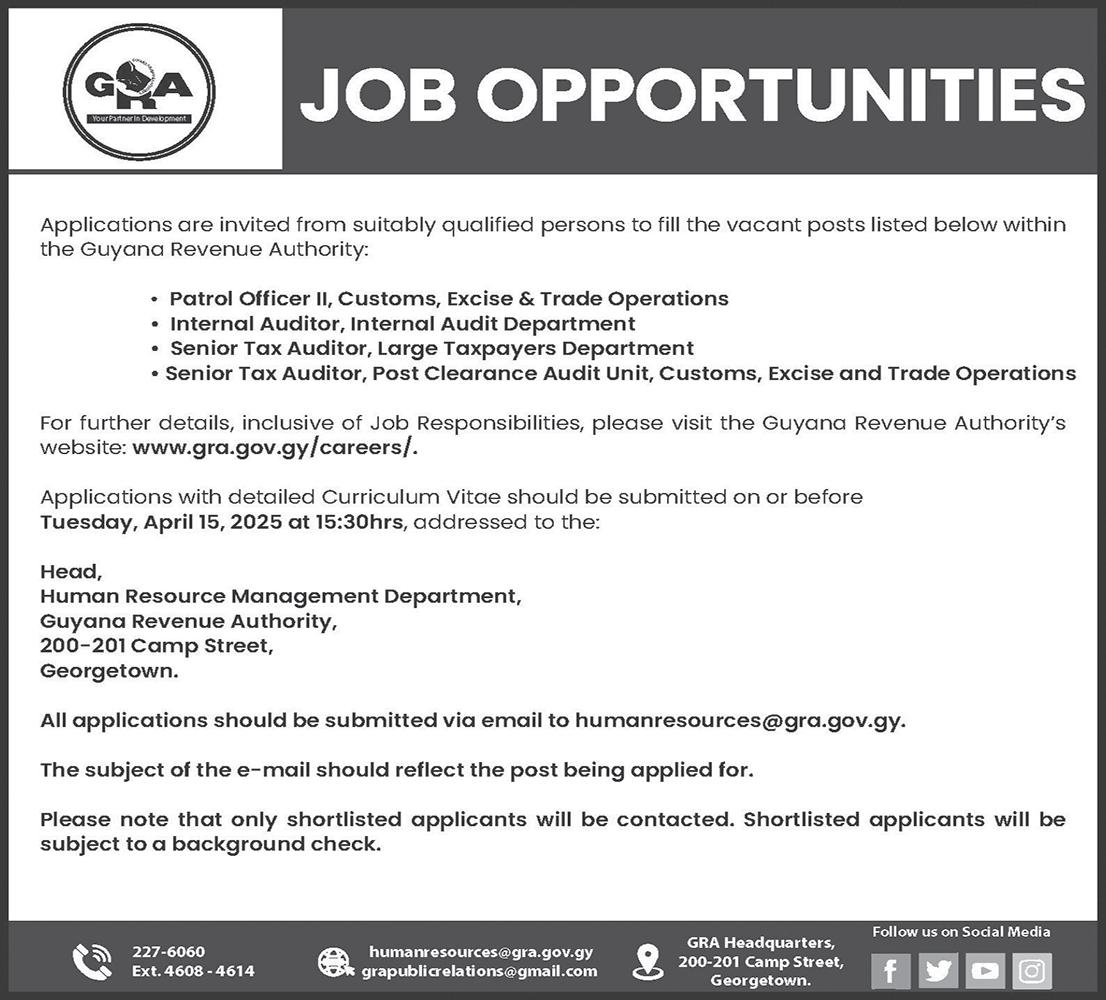
dress all the issues that they keep criticizing the Government in respect to… how they will get investments and reduce crime and unemployment and all the things they are promising,” the Attorney General said.
The AFC and APNU first joined forces in 2015 under the Cummingsburg Accord, revised in 2019 with fewer concessions for the AFC before expiring in December 2022. The coalition won the 2015 elections, but lost power after a no-confidence motion in 2018.
Originally, the AFC held a 40 per cent stake in the coalition, which was reduced to 30 per cent in the 2019 revision. The party’s declining influence was reflected in its poor performance in the 2018 Local Government Elections and its perceived role in the no-confidence motion’s passage.
Following their 2020 election loss, the APNU/ AFC alliance officially ended in December 2022.


With the traditional kite-flying season just around the corner, the use of public spaces usually increases. In some instances, persons use public roadways, and, in some areas, parents would allow their children to run on the roadway to raise their kites.
Assistant Commissioner of Police, Mahendra Singh, who is also the Head of the Traffic Department, has stressed that this can create a problem for traffic as well and pose risks to children.
He, therefore, relayed strict caution for parents:

“Each week we issue tickets to at least 256 persons for helmet-type offences. What it demands of us is that we continue traffic education, we engage with the communities directly, because we know what occurs. So, with that premise, we go directly to people to sensitise them,” he noted.
Despite this, however, he revealed that sensitisation “only works for so long.”
man scams persons of $80,000 with birth certificate promises
The Guyana Police Force (GPF) has clarified that no fraudulent birth certificates were found in their investigation into an alleged forgery scheme.
icates belonging to his immediate family members. Upon verification, these documents were found to be genuine, reinforcing that no fraudulent birth certificates were in circulation.
“And certainly, in any setting where you celebrate, any festival or holiday, we always advise persons not to play and/or celebrate at the side of the road or too close to be in danger. You should not flirt with danger. You know fully well that it has an impact on your safety and your security, or that of your family.”
“But especially the little children, we want to tell the parents and our guardians at this time: you need to have them in spaces [for recreation] and/or play, so to speak; where it is safe. It is away from public transportation movement or ve-
hicular movement… and to ensure that they celebrate clean and clear of all danger,” he advised.
Singh also took the occasion to call for continued sensitisation of motorcyclists, as the GPF recorded some 256 tickets being handed over weekly to persons for not wearing helmets.
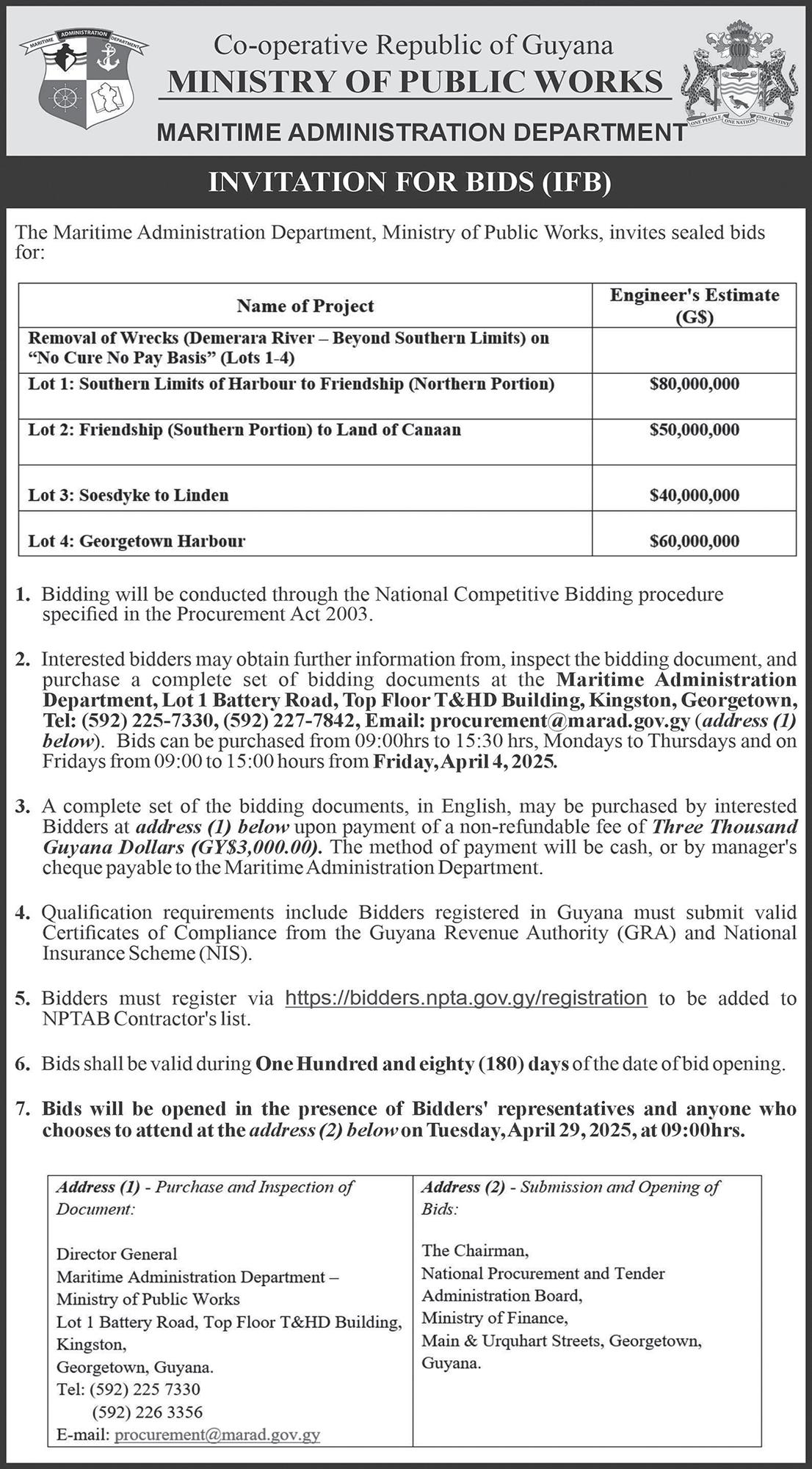
“The sensitisation works to an extent; what you find happening is that from time to time, when we are deployed in traffic directional duties, that is when some of the motorcyclists come out to display their best attitude and style, and their behavioural practices… When you engage these said motorcyclists who are on the road, either in groups or by themselves, one must factor in the safety of that same motorcycle when the Police approach. The motorcyclist seeks to ride as fast as he or she can, seeks to escape from the Police, and/or avoid the Police. And in so doing, at the rate of travel they go at, they can’t control the motorcycle. They lose control, injure themselves, and what the public does in the first place is blame the Police,” he explained.
Authorities have revealed that the suspect at the centre of the probe, a 24-year-old Guyanese national, was not in possession of any forged documents, but instead had attempted to scam unsuspecting individuals.
According to Police reports, the suspect deceitfully promised four individuals that he could acquire birth certificates for them at a cost of $20,000 each. Collecting a total of $80,000 from his victims, the suspect ultimately failed to deliver the promised documents, prompting the victims to threaten Police action. In a desperate bid to avoid legal repercussions, the suspect attempted to refund the stolen money.
A search of the suspect’s premises led to the discovery of several documents, including a few birth certif-
Further scrutiny was placed on a staff member from the regional office responsible for processing birth certificates. However, the employee confirmed that the suspect had applied for his birth certificate legally and had never received or facilitated the issuance of fraudulent documents. Police investigations also found no evidence linking the clerk to any illegal activity.
Meanwhile, law enforcement officers made multiple attempts to locate and engage the defrauded individuals, but these efforts proved futile. The Police have also condemned politically-motivated individuals who have misrepresented the facts of the case for personal or partisan gain. Investigations remain ongoing.


“We
ublic Works Minister
PJuan Edghill has issued a firm warning to contractors, wherein he emphasised that substandard work would not be accepted or paid for as the Linden Road projects near completion.
Back in December 2024, 325 contracts valued at $4.2 billion for road upgrades, and 46 contracts for drainage improvements valued at $76.7 million were awarded to small contractors from the township of Linden, Region Ten (Upper Demerara-Berbice).
The landmark initiative is part of Government’s ongoing community road improvement initiative aimed at enhancing infrastructure while creating employment opportunities.
According to Edghill, a large number of the projects have been completed to date.
“We were pleased that the majority of the contractors who executed these projects did a fantastic job. We had 505 lots, and as I sit here…we have completed about 410. The remaining 95 or thereabout are at

different stages, whether they are to the binding level, some of them are pouring concrete tonight, some of them are waiting on others to complete so they can get theirs done”, he detailed.
“We've been monitoring
this because we want to deliver the services to people. When we complete roads, we have to deal with drainage, we have to deal with culverts, we have to deal with sidewalks, we have to deal with geometric im-
provements,” Edghill said.
Meanwhile, the minister outlined strict rules for contractors, including mandatory testing of roads to ensure they meet the required strength of 4500PSI. PSI, or pounds per square inch,
measures the strength of concrete after it has cured, specifically indicating its compressive strength.
Contractors whose works fail to meet these standards are required to redo the project or risk having their contract cancelled without pay.
Edghill made it clear that only those who perform well would be considered for future projects.
“We will not pay for sloppy work. We will not pay for work that is not acceptable… All these concrete roads must achieve a PSI of 4500. These roads have been tested by our labs before payments were made, and we have said to our engineers and clerical workers, ‘(If) you sign off on projects that are not good quality, you're going to face the consequences, because you're out there to ensure compliance and to show value for money and to ensure government services are delivered adequately and in a proper manner to the people,” he added.
Further, addressing issues with concrete suppliers, Edghill revealed that

some suppliers prioritize private-sector projects over Government contracts, causing unnecessary delays.
“We've made it clear: Government-funded projects must not be sidelined. We’ve also warned against suppliers allowing concrete trucks to drip concrete onto roads, which then requires additional contractors to clean up. These inefficiencies must be corrected,” he said.
The Minister assured that all outstanding issues, including fixing entrances and restoring road shoulders, will be addressed to ensure communities receive the full benefit of the upgrades.
The Education Ministry has launched a 10-year policy aimed at modernizing the teaching of vocational educational skills with the intention of better preparing the future workforce.
The Guyana National TVET Policy 2025-2035 was launched on Wednesday by the Ministry of Education. The policy meets the requirements of the CANTA Quality Assurance Framework, and enhances the mobility of TVET graduates in Guyana and beyond.
During the launch of the policy on Wednesday, Education Minister Priya Manickchand explained that it was developed as a result of Government’s effort to create a proper guideline for skills training. According to her, this guideline will be available to all educational systems responsible for training young people.
“We have a lot of education questions arising, and we found ourselves in Guyana without a guiding document to answer these questions; and while this
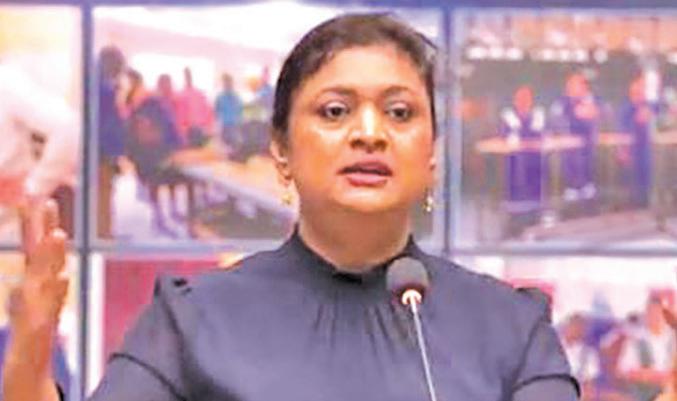
is a 10-year policy, I expect that before it ends, due to the fact that everything is evolving, there will be a review of this, and there will be amendments; but this is our guiding policy for TVET in Guyana that guides the Ministry of Labour and Human Services. This is also going to be a guide for the University of Guyana (UG); it’s going to guide the Cyril Potter College of Education, and ultimately it’s going to guide anyone involved in training our young people,” she said.
Minister Manickchand added that this policy comes at a pivotal time, when Guyana is looking for an array of skilled workers
to complete various skilled jobs.
“We know (that) right here in Guyana, in the ministries, we are searching for engineers with certain skillsets, and persons who have apprenticeship. But those skills are not here, so we can maintain schools in the way that we want to maintain them. The Government alone is searching high and low for skills that we cannot find. So much so that we may have to import skills before we go to those skills. This policy comes at a time when we are trying to build all of this together,” she explained.
Speaking on the way in which the BIT will cap-
italize on this opportunity, Richard Maughn, Chief Executive Officer, said, “This will speak to the vision of the Government and the vision of technical leaders, to make sure that we have individuals who are competent to add to our productivity in the world of work… As actors in the grand scheme of national development, we believe that the demand of the economy should determine what we do in technical training. We also believe that what is happening in our economy here must be considered.
“Therefore, we are committed to doing our part, so that this is not just a document, but something that we would use to effect quality change within our society when it comes to technical training,” he said.
The Government of Guyana recognizes that adequate education and skills can improve the employability of unemployed youths, the working population, the productivity of enterprises, and the inclusiveness of economic growth. This realization has led to increased interest by the Government
and MoE in the formulation of this TVET policy to drive the change necessary to meet development challenges, particularly to create jobs for youths in the country.
On that note, Chief Education Officer (Technical) Dr. Ritesh Tularam relayed that there are five strategic priority objectives for the policy. Policy objective one is to ensure improvements in governance, coordination, and management of the TVET sector in Guyana. Policy two is to develop guidelines to establish and put in place governing boards for TVET institutions. The third policy is aimed at redefining the architecture of TVET funding in order to improve efficiency in TVET delivery. The fourth policy is geared towards establishing and putting into operation the proposed TVET levy in consultation with the private sector; and the fifth policy is to develop a TVET institution to solicit private funding. According to the education officials, the overall goal of utilizing this policy is to bridge the skills gap
across the country and create a workforce for the future.
One of the major weaknesses of the TVET system in Guyana has been the absence of a single coordinating agency to guide, direct and oversee TVET in the country. As a result, TVET delivery system is fragmented among several Government ministries and agencies, notably the Ministries of Education and Labour – each with different governance and management practices.
Guyana's Parliament in 2004 passed two Acts to address two components in Article 46 of the Revised Treaty of Chaguaramas; namely, the Technical and Vocational Education and Training Act (Act No. 11 of 2004) and the National Accreditation Act (Act No. 12 of 2004). Out of Act No. 11 of 2004, the Council for TVET (CTVET) formally became operational in April 2004. The CTVET was established to ensure the supply of adequate human capital to the Guyanese economy, and where possible, to the Caribbean region.

As part of its pledge to amplify every voice and ensure victims receive the necessary support, the Ministry of Human Services and Social Security (MHSSS) has intensified efforts over the years to protect children from perpetrators, regardless of their location.
Human Services and Social Security Minister Dr Vindhya Persaud has reaffirmed that that ministry remains dedicated to tackling child abuse, child sexual abuse, and statutory rape nationwide, working tirelessly to address these critical issues.
In an interview with Guyana Times on the sidelines on an event on Tuesday, the minister highlighted that many cases do not reach the public domain because of reasons of confidentiality.
In recent times, reports have surfaced of incidents of children being exploited sexually. In January, a 16-yearold girl from Baramita in the North West District was murdered by a 40-year-old man with whom she had shared an intimate relationship.
In February, a 25-yearold man of New Amsterdam,

Berbice was charged with rape of a 13-year-old girl who had reportedly run away from her Georgetown home after being sexually abused by her stepfather.
According to the Human Services Minister, the ministry has several programmes that have been effective in addressing these issues.
“Some of those are already in effect and would have been in effect since 2021. And that would include Every Child Safe program, where, in addition to intervention, we are very heavily focused on preven-
tion through awareness education. So, the Child Care and Protection Agency would have -- across the country, including myself on outreaches -- been doing awareness sessions in communities, in schools, in homes,” she detailed.
“And we are working also in care centres as well to ensure that people are aware of the Act, aware of the penalties and repercussions. And what we have started to do is work very, very much intensively with young people and children, and this is expanded beyond the
Govt finalising several legislative changes to address social issues
As the Ministry of Human Services and Social Security (MHSSS) works assiduously to ensure that its legislative framework remains vigorous, stakeholders from the MHSSS are currently working with policy makers to review and finalize several pieces of legislation and policies to address social challenges within the country.
Strengthening of the legal framework of the MHSSS was revealed by Minister of Human Services and Social Security, Dr. Vindhya Persaud, in a media interview on Tuesday.
Dr. Persaud revealed that the MHSSS has been very proactive in its legislative approach over the years. She highlighted that this year, the Sexual Offences Act of 2010, which is already a vigorous piece of legislation, would be amended to address identified weaknesses through consultations with key stakeholders, including the Director of Public Prosecutions, the Judiciary, and the Police Force.
“In terms of legislation, currently there is a review of the Sexual Offences Act of 2010, and there is an important injection. There are many things that are going to be looked at. Now, that is a very progressive - even the 2010 version is a very progressive, very strong piece of legislation. And so what is going to be very significant
in terms of an introduction there would be the Sexual Offenders Database. And there has been consultation, and we are closer to the final version of that piece of legislation,” she detailed.
The amended Sexual Offences Act would require convicts to, among other things, not only provide information about their residence and the vehicles they are using, but also their DNA samples. The law would also mandate the sex offender to provide his or her email address, information on the Internet Protocol (IP) address of any device he or she regularly uses; photograph and medical history, including information on any communicable diseases contracted by the offender.
The proposed legislation provides for the names of Guyanese, or persons residing here, who were convicted locally or overseas for an ‘enterable offence’, to be included in the Sex Offenders Database. The draft amendment to the Sexual Offences Act says such persons could be included whether or not they have completed their sentences.
All those who had committed an ‘enterable’ sexual offence on or before May 25, 2010 would have their names included in the database, which would be under the control of the Police Commissioner.
The minister highlighted two other key pieces of
Child Care and Protection Agency through the Family Enhancement Services Unit (and) the Sexual Offenses Domestic Violence Policy Unit. All of these entities within the Ministry of Human Services would have gone out there, letting children and young people understand their rights,” she added.
In fact, the Minister revealed that the Ministry, in collaboration with the Guyana Police Force (GPF), has launched a new initiative which will see agents from the ministry synergizing with police from each region to conduct investigations.
“We are looking at ramping up our way in which we intervene. We have done several things. We have started the Clean Sweep programme, where we have teams going into every region, working with the police
station and communities, ensuring that we gather all the cases. You've seen a lot of cases. It didn't come by coincidence. The Child Care and Protection Agency went into many of those regions, including Region 1, and would have garnered the information and all of the complaints and the allegations. And they have been, I would say, accelerating the momentum on it.”
To address the backlog of cases, the minister revealed that the ministry is moving to establish its own forensic interview unit.
“Remember, the Child Care and Protection Agency is responsible for the forensic interview for children. That's done in partnership. We are working to have our own forensic interview unit, to address any backlog and have the capacity to be able to do forensic interviews more often. And so, all the cases of
sexual abuse against children, they have to have a forensic interview. That's our responsibility. Then a report has to be prepared by us. Those are being prepared, and we are working to increase the rate at which these reports are being prepared,” she explained.
The minister also highlighted a new initiative for child protection services that will provide stakeholders with important information.
“We are developing a referral pathway, mirroring the gender-based violence referral pathway, for child protection services. So, when any case happens, internally by stakeholders, they have all the information on who they need to contact and what the process entails. Because many times it is stuck somewhere, and we are working to ensure it's not stuck at us,” she explained.
Caricom calls for adequatelyresourced
legislation that are currently being worked on.
“The harassment legislation. We have had intense consultations. We are closer to the final version of that. And there are three other vague legislation. One is right now on the Order Paper at Parliament and there are two awaiting all of that. So, lots of work happening in the background, and happening to ensure that our legislation, one: they’re increased, and two: they’re strengthened,” she detailed.
Earlier this year, during the budget consideration of estimates and expenditure, the minister had highlighted that three new polices: focusing on early childhood development, gender inclusion, and child care reunification, would be introduced this year.
Dr. Persaud revealed on Tuesday that two of these policies are almost completed.
“Those policies are important to support what we do in terms of programming and strategy and direction… So we are working on all of those, and we are nearing final draft with two of those,” she said.
For 2025, the Ministry of Human Services and Social Security received a budget of $58.5 billion, with a focus on social initiatives and supporting vulnerable populations, including senior citizens, women, children, and persons with disabilities.

Caricom, as a member of the grouping of small island developing states (SIDS) that are especially vulnerable to climate change, has been at the forefront of advocacy for the Loss and Damage Fund to be adequately resourced.
Programme Manager, Sustainable Development, at the Caricom Secretariat, Amrikha Singh, has reiterated calls for the international community to allocate more resources to the fund. She also delved into some of the progress Caricom has made in organizing the Fund’s structure.
“With respect to the Loss and Damage Fund, I mean, as a region and as SIDs in general, we advocate and we call upon the international community to ensure that the fund is adequately resourced. There has been some progress, in that the new executive director has been identified, as well as the host country for the fund,” she explained.
The Fund was put into operation in 2024, and is accountable to, and functions
under, the guidance of the Conference of the Parties (COP) and the Conference of the Parties serving as the Meeting of the Parties to the Paris Agreement (CMA).
To date, the total pledged financial support for the Fund exceeds $730M. However, developing countries need more than $400B each year to address loss and damage.
The Loss and Damage Fund, under its first director, Ibrahima Cheikh Diong, is scheduled to meet in early April in Barbados. Singh stressed the importance of this meeting, noting that it will foster fruitful conversations between key stakeholders, further ensuring that the region is well aligned to achieve its targets.
“We also expect him to be in the region in the first quarter of this year, when the Loss and Damage Fund will have their board meeting in the region. So, it will also provide an opportunity for us to engage more fully in how we wish to see the effect, well, to provide our impotence and effectiveness of this fund.”
Diong brings more than three decades of global experience in climate change, finance, and development. He will provide strategic leadership and oversight of the Fund’s Secretariat, and assist the Board in delivering on the Fund’s mandate to provide financial support to vulnerable countries hardest hit by climate impacts.
Diong has professional leadership and management experience in Africa, USA, Europe and Asia. In September 2020, he was appointed as UN-Assistant Secretary General and Director General of the

African Union specialized agency, the African Risk Capacity (ARC) Group, where he is responsible for defining and executing the strategic vision of the institution.
He graduated from the School of International and Public Affairs (SIPA) at Columbia University in New York City with a Master of International Affairs (MIA) specialized in environmental policy management and international finance.
Guyana’s advocacy for the fund
An agreement to establish a Loss and Damage Fund was, for many, the highlight of the United Nations Climate Conference COP27, and the culmination of decades of pressure from climate vulnerable developing countries like Guyana. Six months after the agreement was reached by world leaders in Egypt in November 2022, Prime Minister Mark Phillips had called for the speedy establishment of the financing arrangement.

Chairman of Region Six (East BerbiceCorentyne), David Armogan, has called on Corentyne residents to open their eyes and look at the developments which have taken place under the current administration.
As he addressed residents of Whim village on the Corentyne Coast during a community meeting, Region Six Chairman David Armogan declared that anyone can be fooled.
Declaring that some 2000 jobs were lost from the Rose Hall Sugar Estate and 1500 were lost from the Skeleton Sugar Estate when those two estates were shut down by the APNU/AFC administration, he pointed out many promises were made by the APNU/ AFC, but none was ever fulfilled.
Among the promises the APNU/AFC had made, he said, was that if they were elected into government, they would ensure that rice farmers are paid $9000 per bag of paddy. However, after taking office, when they were approached by rice farmers

who were seeking better prices for their paddy, the then President, David Granger, told them that rice farming was not government’s business.
“They said that it is an arrangement between the farmer and miller. President Granger also said it is not Government’s responsibility to find jobs; that is for the private sector. We have been finding jobs. Many of those
who were severed from the Rose Hall Estate we have rehired, and we have reopened the estate,” Armogan reminded as he called on residents to look at the track record of APNU/AFC in government.
“Over the four and a half years under the Irfaan Aliled administration, we have reinstated the school children cash grant which was taken away by the previ-
ous administration. Not only that, but we have increased it to $55,000. Under public infrastructure, we have developed so many roads…,” he detailed.
Chairman Armogan also spoke about healthcare improvement within Region Six, where two new hospitals are being built, one of which would shortly be opened under the health sector.
According to Armogan, schools were run down under the previous administration.
“They believed that most of the people in Region Six supported the PPP [People’s Progressive Party], and so they wanted you to punish and they allowed all of the schools to run down. Since we came back into government, we have repaired all of the schools, and those that were nor fixed will be fixed this year.”
Armogan noted that although he was not boasting about what has been done to improve the lives of citizens, development has been so abundant in the region that it has resulted in a shortage of labour in the private sector. “Many in the private sec-
tor have been importing labour from overseas,” he said.
“Open your eyes and see the development!” he urged.
Upgrade
Minister within the Public Works Ministry, Deodat Indar, has said that since this administration took office in August 2020, $45 billion has been spent in Region Six to upgrade the road network, and every community has benefited from those upgrades.
Pointing out that, in 2020, some 16 community roads were upgraded in the region, he said 44 community roads were upgraded in 2021 and 436 were upgraded in 2022; while 316 were upgraded in 2023 under first phase of government’s road improvement programme, and 533 were upgraded in phase two of the same programme. He added that 258 roads were upgraded last year, and 259 are slated to be upgraded this year.
“Just imagine! $45 billion for building roads, and the money goes to nobody else outside of Region Six! I
can tell you that in this region there are hawks; they make sure that the people that work here in the region and have some capacity are given the work. So, the money stayed in the region,” he detailed.
“You’re going to build your concrete road, you hire some staff, you do it, you make your money, the people that work for you make money; we create jobs in the process,” he explained. “You have got to get an excavator operator; he gets a job. You have got to get a man to fix the excavator; you’ve got to get a foreman; you have got to get workers to tie steel…,” he detailed, adding, “All of this work is created, so when the money is spent and the investment is made by the Government, it goes into the hands of the people of the region. And that is a very important point! It didn’t go to nobody else! We spent $45 billion, just think about the magnitude of money!” he admonished.
“That is just on the roads and bridges; the small road and small bridge,” he added.
Some 30 police ranks would be participating in six weeks of theoretical training in heavy-duty machinery operation and maintenance which would have practical support at locations across the country.
This programme is aimed at building the skill set of its participants and improve the operational competencies and effectiveness of service delivery.
Officially launched on Tuesday at the Officers’ Training Centre by Labour Minister Joseph Hamilton, MP, in collaboration with the Traffic Department of the Guyana Police Force, the theme of the programme is “Enhancing Capacity to Meet Future Demands in a Rapidly Evolving Environment”.

Some of the ranks present at the launch of the training
ed that, in “Region Four alone, 3,632 people were trained, including 972 males and 2,660 females, with a total expenditure of $300 million.”
He stressed the importance of gender equality in training programmes, and reaffirmed Government’s commitment to ensuring every trained individual receives official certification.
Delivering the programme’s overview, Assistant Police Commissioner, ‘Traffic Chief’ Mahendra Singh, emphasized the significance of the training in upgrading operational readiness.
Training would con-
It is a key component of the Guyana Police Force’s Strategic Pillars 2022-2026, and the training, done in partnership with the Board of Industrial Training (BIT), would equip participants with the competencies to operate heavy-duty machinery and enhance efficiency and safety in the Police Force.
sist of theoretical instruction and practical exposure, with emphasis on key areas such as: Safety while handling equipment, Basic Mechanics & Maintenance, Practical Training, Regular Re-
Phillips was at the time addressing a high-level meeting at the United Nations Headquarters in New York, intended to review the Sendai Framework for Disaster Risk Reduction (2015-2030).
While the historic decision was welcomed, this is but the first step, and success will depend on how quickly this fund gets off the ground. Representatives from 24 countries were tasked with working together to decide what form
the fund should take, which countries should contribute, and where and how the money should be distributed. Beyond that, the Prime Minister pointed out that the classification of many SIDS as ‘middle-income’ has impeded access to concessional financing, which is critical for overall development, including building resilience.
Phillips said countries in Latin America and the Caribbean (LAC), many
SIDS, have made significant progress in disaster risk reduction in recent years, with many countries implementing policies and programmes to reduce vulnerability and build resilience. However, he stated, more needs to be done to address the underlying risk drivers that contribute to disasters in our region. This includes promoting sustainable development and addressing the impacts of climate change.
evaluation of Participants for Improvement. This is encompassed in the Force’s overall vision of enhancing technical capability, reducing dependence on external help, and promoting professional development among officers.
Some of the objectives of the programme are: Increasing efficiency in police operations, Prioritizing safety as priority number one, and developing inhouse machine-handling self-reliance.
Beyond improving operational capabilities, successful completion of the training would create opportunities for future certification by BIT and other external accreditation bodies.
In his remarks at the launch, Labour Minister Joseph Hamilton highlighted Government’s commitment to building the workforce, and the necessity of preparing police officers with technical skills.
Minister Hamilton not-
“This heavy-duty machinery training programme, conceptualized by the Guyana Police Force and designed in partnership with the Board of Industrial Training, is a structured and comprehensive initiative aimed at equipping participating ranks with the essential technical skills and safety knowledge required for operating heavy-duty equipment,” he stated.
The launch concluded with the official declaration of the commencement of the programme by Inspector Richard Trotz, marking a milestone for the Guyana Police Force.


Mexican President Claudia Sheinbaum said on Wednesday that Mexico does not plan to impose tit-for-tat tariffs on the United States, ahead of President Donald Trump's planned announcement of new tariffs.
Trump later announced sweeping new tariffs on countries around the world on Wednesday. The move is expected to escalate a trade war with global partners, as well as increase prices and upend a decades-old trade order. However, Mexico and Canada avoided fresh tariffs on Wednesday with President Trump exempting the United States' top trading partners from his new 10% global tariff baseline, although previous duties remain in place.
Goods from Mexico and Canada that comply with the USMCA trade agreement between the three countries will largely remain exempt from tariffs,

except for auto exports and steel and aluminium which fall under separate tariff policies.
Sheinbaum said at her daily morning press conference that Mexico will today "announce a comprehensive program, not a tit-for-tat on tariffs".
"Let's see what announcement they make, but we have a plan to strengthen the economy under any circumstance," Sheinbaum
added.
Sheinbaum has so far spoken carefully about the possibility of retaliatory tariffs against the US, not ruling them out entirely, but calling for calm and saying the focus must be on protecting the Mexican economy.
Canada, on the other hand, will fight Trump's tariffs with countermeasures, Prime Minister Mark Carney said on Wednesday.
(Excerpts from Reuters)
mulls “all possible actions” as Congress lays framework for trade
Brazil said on Wednesday it is assessing all potential responses to the United States' 10 per cent tariffs on imports from Latin America's largest economy, while its Congress approved a bill outlining the framework for trade retaliation.
"The Brazilian Government is evaluating all possible actions to ensure reciprocity in bilateral trade, including resorting to the World Trade Organisation, in defence of
legitimate national interests," the Government said in a statement.
Minutes earlier, Brazil's Congress approved a bill, which still requires a ratification by President Luiz Inácio Lula da Silva, that establishes a legal framework for Brazil to respond to potential unilateral trade measures targeting its goods and services, including countermeasures such as tariffs.
Though the text did not specify the United States, the bill gained trac-
tion with lawmakers in recent weeks amid the US Administration's threats to impose tariffs.
The Government also highlighted the framework's approval in its response to the US tariffs.
Brazil also said it remained open to dialogue and believes US claims the tariffs are reciprocal do not "reflect reality", pointing to the US recording "recurrent and significant trade surpluses in goods and services with Brazil". (Reuters)
Aman whom the Police believe to be one of the island’s major “crime lords” was fatally shot during a reported clash with cops on Tuesday.
Corey Rowe, otherwise called Rasta Corey, was the alleged leader of the Elbow faction criminal gang which operated in the troubled Central Village community in St Catherine. According to Jamaica Observer sources, Rowe had been seeking to assert him-
self as the dominant figure or “don” across the entire Central Village area. He allegedly orchestrated the quadruple murder involving Justin McGregor, better known as “AK Man”, in the area of Central Village known as China Town in 2023.
The Observer sources say “AK Man” had emerged as one of the top gangsters in Central Village and was wanted by the St Catherine South Police Division.
But in a power play, Rasta Corey orchestrated his killing, as well as that of his cronies Mark Ellis, also called “Frassy T”, and two other men who were identified only by their aliases — “Otto Man” and “Mento”.
The sources further claimed that Rowe played a central role in fuelling the ongoing conflict between the Compound and Zion/ Brown’s Lane communities. (Excerpt from Jamaica Observer)
Barbadian Foreign Affairs Minister Kerrie Symmonds says the economic and strategic benefits Barbados stands to reap from hosting the African Export-Import Bank (Afreximbank) far outweigh the Bds$17 million valuation of the state lands granted for its Caribbean headquarters.
In defending the Government’s decision during a press conference at Parliament, he called the partnership with Afreximbank a generational opportunity that will transform Bridgetown into a regional centre for trade, business and innovation.
Last week Monday saw
a groundbreaking ceremony for construction of the Afreximbank African Trade Centre on 2.037 hectares at Jemmotts Lane, St Michael.
“This is not just a patch of idle land. This is a platform for economic rebirth,” Symmonds declared. “We are getting a US$300 million investment that brings jobs, foreign exchange, a trade centre and a hotel, all of it built and staffed by Barbadians. That is real value.”
He told reporters the decision to host Afreximbank was one which required swift action, as there were many suitors in line.
“Yes, consultation is always welcome, but at some
point a government must act in the best interest of the nation. If we had hesitated, the bank could have easily gone to The Bahamas. We would have lost a once-in-a-lifetime opportunity.”
The African financial institution has committed to injecting up to US$3 billion into Caricom economies once all member states are on board – a move Symmonds said no other global entity was currently offering.
He also pushed back on claims that the deal set a dangerous precedent, pointing out the long history of Barbados offering land and tax concessions to attract international organisations. (Excerpt from Nation News)
CCJ President says court remains “resilient and optimistic” despite challenges
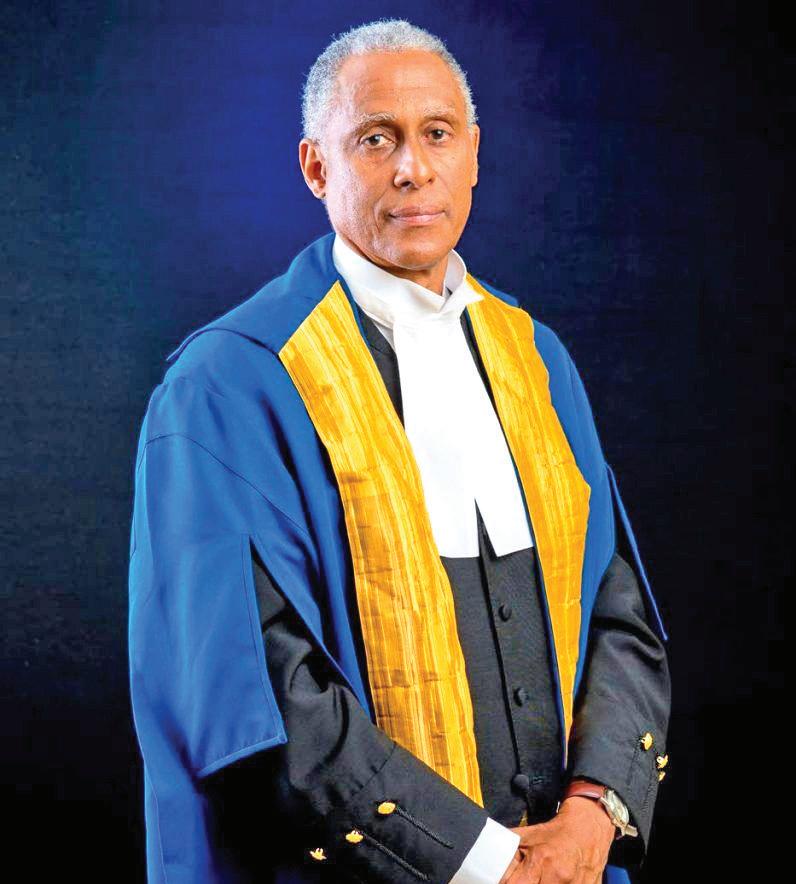
President of the Trinidad-based, Caribbean Court of Justice (CCJ), Justice Adrian Saunders says despite its challenges the court, which was established to replace the London-based Privy Council as the region’s final and highest court, “remains resilient and optimistic”.
The CCJ was established in 2001 and while most of the Caribbean Community (CARICOM) countries are signatories to its Original Jurisdiction, only Barbados, Belize, Dominica, St Lucia and Guyana are members of its Appellate Jurisdiction. In
addition, the CCJ functions as an international court interpreting the Revised Treaty of Chaguaramas that governs the regional integration movement.
Delivering the annual Macfadyen Lecture, Justice Saunders spoke on the theme “Caribbean Court of Justice at 20 years”, providing an in-depth examination of the regional court .
“I believe that it says something for the vitality of the rule of law in the Caribbean that all the judgments of the CCJ have been fully and promptly complied with, especially given that, in not a few of these cases, incumbent governments
were on the losing side of the litigation and the orders made by the Court must have been very bitter pills to swallow,” he told the audience.
He said despite the challenges, the CCJ remains “resilient and optimistic” and that the judges and staff of the Court are fully cognisant of the fact that the establishment of the CCJ “ is perhaps the most impactful decision ever made by the Caribbean Community.
“We see ourselves as stewards. As should be the case in a well-functioning democracy, through our decision-making, a healthy dialogue takes place between the CCJ and the Parliaments of the various States.
“In not a few instances, legislatures have enacted new or amended existing legislation and legal procedures to accord either with our judgments or intimations contained in those judgments.”
Justice Saunders said that no court, anywhere in the world, can honestly state that it has attained a state of perfection, but every court must continuously aim for perfection.
“A court is one of excellence if it always so strives, and, in this regard, the CCJ makes every effort to live up to its vision “To be a Model of Judicial Excellence”. (Excerpt from Trinidad Guardian)






Oil prices fell to negative territory after rising by a dollar in post-settlement trade on Wednesday as US President Donald Trump announced reciprocal tariffs on trading partners, stoking concerns that a global trade war may dampen demand for crude.
Brent futures settled 46 cents higher, or 0.6 per cent, at US$74.95 a barrel, while West Texas Intermediate (WTI) crude futures gained 51 cents, or 0.7 per cent, to settle at US$71.71.
US futures rose by a dollar and then turned negative, along with the Brent contract, over the course of Trump’s press conference on Wednesday afternoon in which he announced tariffs on trading partners including the European Union, China and South Korea.
For weeks Trump has touted April 2 as “Liberation Day”, bringing new duties that could rattle the global trade system.
A chart listing countries and tariffs that Trump showed during his announcement did not detail tariffs on Canada and Mexico. However, USMCA-compliant goods from Mexico and Canada, including oil, would remain exempt from the tariffs, a senior official told Reuters.
Canada supplies some four million barrels per day of its crude oil to the United States.
Trump’s tariff policies could stoke inflation, slow economic growth and escalate trade disputes, possibilities that have limited oil price gains.
“Crude prices have paused last month’s rally, with Brent finding some resistance above US$75, with the focus for now turning from a sanctions-led reduction in supply to Trump’s tariff announcement and its potential negative impact on growth and demand,” said Ole Hansen, head of commodity strategy at Saxo Bank.
Comments from Mexico eased some worries about a trade war between the two countries after Mexican President Claudia Sheinbaum said on Wednesday that Mexico does not plan to impose tit-for-tat tariffs on the United States.
“Oil is selling off a little on the news, and it could introduce some additional trade and economic uncertainties, but I think people were worried it would be more extreme,” said Josh Young, chief investment officer at Bison Interests following Trump’s tariff announcement.
Trump has also threatened to impose secondary tariffs on Russian oil, and on Monday he toughened sanctions on Iran as part of his Administration’s “maximum pressure” campaign to cut its exports.
Adding to the complex global supply picture, Russia, the world’s second-largest oil exporter, on Wednesday imposed restrictions on another major oil export route, suspending a mooring at the Black Sea port of Novorossiisk a day after restricting loadings from a key Caspian pipeline.
Russia produces about nine million barrels of oil a day, or just under a 10th of global production. Its ports also ship oil from neighbouring Kazakhstan.
Meanwhile, investors on Wednesday shrugged off mostly bearish US Government crude inventory data. US crude inventories posted a surprisingly large build of about 6.2 million barrels last week, Energy Information Administration data showed.
“The report was bearish in my view, with larger crude inventories and total petroleum inventories rising,” UBS analyst Giovanni Staunovo said. “But the market took it as neutral, as the crude build is driven by a sharp increase in Canadian crude imports, likely ahead of the fear of the introduction of new tariffs.” (Reuters)
The latest round of US trade tariffs unveiled on Wednesday will sap yet more vigour from a world economy barely recovered from the post-pandemic inflation surge, weighed down by record debt and unnerved by geopolitical strife.
Depending on how President Donald Trump and leaders of other nations proceed now, it may also go down as a turning point for a globalised system which until now had taken for granted the strength and reliability of America, its largest component.
“Trump’s tariffs carry the risk of destroying the global free trade order the United States itself has spear-headed since the Second World War,” said Takahide Kiuchi, chief economist at Nomura Research Institute.
But in coming months it will be the plain and simple price-hiking -- and therefore demand-dampening -- effects

of new levies applied to thousands of goods bought and sold by consumers and businesses across the planet that will prevail.
“I see it as a drift of the US and global economy towards worse performance, more uncertainty and possibly heading towards something we could call a global recession,” said Antonio Fatas, macro-
ARussian missile attack on Wednesday struck an enterprise in the central Ukrainian city of Kryvyi Rih, killing at least four civilians, officials said.
An eight-year-old boy and a six-year-old girl were among 14 injured, the regional governor said on Telegram. The boy was hospitalised in severe condition, he added.
President Volodymyr Zelenskyy, who was born in Kryvyi Rih, shared photographs of the aftermath of the attack on X, showing bodies lying bleeding on the ground, heavy black smoke rising into the sky and a building on fire.
“Everywhere in the world, such strikes are called by the same name -- terror. The only way to stop this is by applying sufficient pressure on Moscow, on the Russian system, forcing them to abandon war and terror,” Zelenskyy added, appealing to the US and other allies.

Ukraine’s President Volodymyr Zelenskyy attends a press conference with German Foreign Minister Annalena Baerbock (not pictured), amid Russia’s attack on Ukraine, in Kyiv, Ukraine, April 1, 2025 (Reuters/Alina Smutko photo)
Authorities did not give further details of the business that was hit. The blast wave damaged a gym, windows in an administrative building and apartment blocks, the governor added. (Excerpt from Reuters)
economist at the INSEAD business school in France.
“We are moving into a world which is worse for everyone because it is more inefficient,” said Fatas, who has acted as a consultant for the International Monetary Fund and World Bank.
Speaking in the White House Rose Garden, Trump said he would impose a 10
per cent baseline tariff on all imports and held up a chart showing higher duties on some of the country’s biggest trading partners, including 34 per cent on China and 20 per cent on the European Union.
A 25 per cent auto and auto parts tariff was confirmed earlier.
Trump said the tariffs would return strategically vital manufacturing capabilities to the United States.
Under the new global levies imposed by Trump, the US tariff rate on all imports jumped to 22 per cent -- a rate last seen around 1910 -from just 2.5 per cent in 2024, said Olu Sonola, head of US economic research at Fitch Ratings.
“This is a game changer, not only for the US economy but for the global economy,” Sonola said. “Many countries will likely end up in a recession.”
(Excerpt from Reuters)
‘wonderful’
Directors including Ron Howard, Francis Ford Coppola and Michael Mann have paid tribute to actor Val Kilmer, following his death aged 65.
Kilmer starred in some of the biggest movies of the 1980s and 90s, including “Top Gun†and “Batman Foreverâ€.
Coppola described Kilmer as “a wonderful person to work with and a joy to know”, while Howard praised his “awesome range as an actor”.
Singer Cher, a former girlfriend of Kilmer’s, summed him up as “funny, crazy, pain in the ass, GREAT FRIEND” and “brave” during his illness.
Cher, who previously dated Kilmer, remembered him as a “great friend” who was “brave” during his illness
Kilmer died of pneumonia on Tuesday in Los Angeles, his daughter Mercedes told US media. She said her father had been diagnosed with throat cancer in 2014, but later recovered.

Tracheotomy surgery affected his voice and curtailed his acting career, but he returned to the screen to reprise his role as fighter pilot Iceman alongside Tom Cruise in 2022’s “Top Gun: Maverick†. Kilmer’s other film credits included 1991’s “The Doors†-- playing the legendary band’s frontman Jim Morrison -- plus the western “Tombstone†and crime drama “Heat†. (Excerpt from BBC News)
Israel announced a major expansion of military operations in Gaza on Wednesday, saying large areas of the enclave would be seized and added to its security zones, accompanied by large-scale evacuations of the population.
Prime Minister Benjamin Netanyahu said troops were
seizing an area he called the Morag Axis, a reference to a former Israeli settlement once located between the cities of Rafah and Khan Younis in the south of the Gaza Strip, some 3-4 kilometres from the southern border.
“Because we are now dividing the Strip and we are increasing pressure step by step
so they will give us our hostages,” he said in a video message.
He said the move, which would cut off Rafah from Khan Younis, would give Israel control of a second axis in southern Gaza in addition to the socalled “Philadelphi Corridor”, running along the border with Egypt, which Israel sees as a
key line preventing the smuggling of weapons into Gaza. Separately, the Israeli military said troops had completed the encirclement of the Tel al-Sultan area near Rafah and killed dozens of militants. It had also found two rockets as well as a launcher aimed at Israeli territory. (Excerpt from Reuters)

































You have more options than you realize. Before agreeing to participate in something that offers no returns, consider your needs and long-term plans. Refuse to fall prey to emotional blackmail.
Pay attention to financial transactions. A lifestyle change that helps you stay healthy, wealthy and wise will help ease stress and point you in a positive direction.
Make your position clear, and be adamant regarding your motives and expectations. Honesty is the quickest route to victory. Refuse to let emotions lead to mistakes and loss.
Explore ways to improve your skills and how you apply them to your everyday routine. Refuse to let outside influences or competitive challenges cause doubt or setbacks.
Search for innovative ways to apply your knowledge and skills in the workforce. Take charge, open doors and change whatever is outdated or standing between you and your chance to advance.
Stop, observe and rethink your strategy. A partnership appears to be losing equality. Offer practical solutions, and be sure to divvy up responsibilities evenly.
Look for opportunities to promote your skills, attributes and hopes for a brighter future. Refuse to let emotions, drama, temptation and indulgence creep in and take over.
Try something new and exciting, or adjust one of your skills to enhance a niche waiting for a makeover. How you present yourself and your attributes will flourish if you network and socialize.
Sit back and observe. The information you gather will help you negotiate when the time is right. Avoid temptation, excess and taking on more than you can handle.


Speak up; ask questions and rephrase any misconception you or someone else may have. The direct approach will help you avoid misunderstandings and encourage positive lifestyle changes.



Pick up the pace and finish what you start. Being grateful doesn’t mean you can go over budget. Maintaining as much revenue as possible is necessary for your success.

Put your head down and get busy. Work toward your goal, and don’t stop until you are satisfied with the results. Say no to invitations that are costly emotionally and financially.






Mohammed Siraj's fiery 3 for 19 against his former team, backed up by Jos Buttler's unbeaten 73 off 39 balls, helped Gujarat Titans (GT) spoil Royal Challengers Bengaluru's homecoming and coast to an eight-wicket victory at the Chinnaswamy Stadium.
Playing against RCB for the first time after seven years with them, Siraj returned to Bengaluru with a point to prove. Bowling at speeds in excess of 140 kilometres per hour (kph), he rattled the batters in the powerplay and also picked up a key wicket in the death overs. Despite Siraj's efforts, RCB notched up 169 for 8, riding largely on Liam Livingstone's fifty and cameos from Jitesh Sharma and Tim David. With the ball, Josh Hazlewood and Bhuvneshwar Kumar were on the mark in the powerplay for RCB. But as the ball got older, the bowling also fizzled away. While Shubman Gill fell cheaply, Sai Sudharsan and Buttler added 75 off just 47 balls to give the chase impetus. Sherfane Rutherford then came in as Impact Sub and added an unbroken 63 off 32 balls with Buttler, as GT romped home with 13 balls to spare.
This was GT's second win in three games, while RCB's loss was their first of Indian Premier League (IPL) 2025 after two stellar wins.
Siraj magic in Bengaluru against Bengaluru
Siraj has done his siuuu celebration several times at the Chinnaswamy in the last seven years. Most times, it has been met with a roaring response. On Wednesday, he went on his celebratory run twice in the powerplay to pin-drop silence. Having not been retained by RCB ahead of the auction, Siraj,

now playing for GT, had matters to settle. And he did it in style.
It was his spell in the powerplay that stood out. Operating at mid-140kph, Siraj was not just bowling heat, but was also precise with his lengths. According to ESPNcricinfo's data, of the 18 balls Siraj bowled in the powerplay, six of his deliveries landed on a length, off which he picked up two wickets. More importantly, eight of his deliveries finished in line with the stumps, which meant he barely gave the batters any room to work with. RCB managed a control percentage of just 50 against Siraj in the powerplay.
Siraj should have had Phil Salt in his opening over, but Buttler dropped a sitter behind the stumps. Soon after, Siraj had the zing bails flashing when Devdutt Padikkal waltzed down the track, missed, and saw his stumps in a mess. Salt thumped Siraj for a 105-metre six over midwicket in his next over, to which Siraj responded by flattening Salt's off stump with a 145.9kph thunderbolt.
Siraj later returned and

picked up the key wicket of Livingstone in the 19th over to finish with 3 for 19, sending down 14 dots in his four overs.
Livingstone, Jitesh and David lift RCB
At 42 for 4 after 6.2 overs, RCB were in big trouble. Rajat Patidar had just fallen to Ishant Sharma, and the Chinnaswamy was silent. But Jitesh made his intentions clear quite early. He got going with a stylish pull off Ishant before going big. He first brought his wrists into play to loft Ishant over longon, and dispatched him for two more fours as RCB collected 17 runs off the ninth over.
Livingstone, at the other end, was struggling to get away before finally walloping Rashid Khan over deep square leg. Livingstone was dropped twice, and also survived a missed stumping, and made the best of his luck.
Jitesh and Krunal Pandya fell in quick succession to R Sai Kishore, who picked up 2 for 22 in his four overs, which included breaking a flourishing 52-run stand between Jitesh and Livingstone in the 13th over. He tossed one up at Jitesh, who ended up skying it to long-on.
Two overs later, Sai Kishore got Krunal when the ball seemed to hold on the pitch, and a leading edge went right back to the bowler. It was after that that Livingstone took over for RCB. He broke the shackles with a huge six over deep midwicket against Rashid, while David also hit a six and a four. Despite that, RCB were struggling on 129 for 6 after 17 overs. But Livingstone pumped Rashid

for three sixes in the 18th to reach his fifty off 39 balls. In all, he smashed Rashid for 39 runs off 17 deliveries, with five sixes.
RCB tonked 64 runs in the last five overs, thanks largely to David's hitting, as he thumped 32 off 18 balls. But 169 at the innings break looked under-par.
Buttler does it again Buttler came into this IPL under pressure. He had just quit the England whiteball captaincy after a disastrous Champions Trophy, and he had not been among the runs either. He was going to a new IPL team after flourishing with Rajasthan Royals, and was going to bat at number three, having mostly opened previously.
But in just three innings, Buttler has proved that

nothing has changed. He was coming into the game with scores of 70*, 8, 106*, 0, 0 and 100* against RCB since IPL 2022.
On Wednesday, he shored up his re cord further.
Buttler came in to bat with GT strug gling a touch. Hazlewood and Bhuvneshwar were making the ball talk, and not giving much away. Gill struck Bhuvneshwar over long-on, but fell the next ball, caught at deep third. At that stage, GT were 32 for 1 after 4.4 overs.
settle. At one point, he was on 5 off 8 balls, but he targeted Rasikh Salam, and just like that got into his stride. Buttler struck Rasikh for 27 off just 12 balls, and everything fell into place.
Sudharsan, at the other end, was at his fluent best as he scored 49 off 36 balls, and put on 75 with Buttler. Once Sudharsan fell, Buttler went up another gear and raced to his half-century off 31 balls. Rutherford, who came in at number four, also got going quickly as GT raced towards their target.
Their quick partnership helped GT improve their net run rate with a thumping win. RCB's loss, meanwhile, hind Punjab Kings and Delhi

Buttler took his time to

Challengers Bengaluru (20 ovs maximum) Phil Salt b Mohammed Siraj 14 Virat Kohli c Prasidh Krishna b Arshad Khan 7 Devdutt Padikkal
b Mohammed Siraj 4 Rajat Patidar (c) lbw b Sharma 12 Liam Livingstone c †Buttler
b Mohammed Siraj 54
Jitesh Sharma † c Tewatia
b Sai Kishore 33
Krunal Pandya c & b Sai Kishore 5 Tim David b Prasidh Krishna 32 Bhuvneshwar Kumar not out 1 Extras (lb 4, w 3) 7
Total 20 Ov (RR: 8.45) 169/8
Did not bat: Josh Hazlewood, Yash Dayal Fall of wickets: 1-8 (Virat Kohli, 1.4 ov), 2-13 (Devdutt Padikkal, 2.2 ov), 3-35 (Phil Salt, 4.4 ov), 4-42 (Rajat Patidar, 6.2 ov), 5-94 (Jitesh Sharma, 12.4 ov), 6-104 (Krunal Pandya, 14.2 ov), 7-150 (Liam Livingstone, 18.2 ov), 8-169 (Tim David, 19.6 ov) Bowling O-M-R-W Mohammed Siraj 4-0-19-3


The Guyana Harpy Eagles (GHE) found themselves in a spot of bother on Wednesday morning when Round Six of the West Indies Championship bowled off.
However, Kevlon Anderson and Keemo Paul were important to their recovery, as the Guyanese managed to leave the hosts four down by the close of play.
Taking on the Leeward Islands Hurricanes at Warner Park, in Basseterre, St Kitts and electing to bat first, the visitors found themselves reeling not too long after.
Both openers in
Raymond Perez and Matthew Nandu contributed 10 runs while Captain Tevin Imlach, Vice Captain Kemol Savory and Kevin Sinclair contributed 5, 4 and 13 runs respectively as the Harpy Eagles faltered at 69-5 after just 20 overs.
However, a 50-run partnership between Anderson and Paul did the necessary repair work.
Paul hit 31 off 24 balls while Ronaldo Alimohamed later contributed 30 from 42 deliveries. Anderson was virtually the hero, notching an unbeaten 96-ball 77, laced with 10 fours and one six, getting the Harpy Eagles to 193 all out in 44.4

overs.
Rahkeem Cornwall was the pick of the Leeward bowlers, claiming 3-25 from 4.4 overs. Oshane Thomas, Justin Greaves, and Hayden Walsh claimed two scalps each.
Leewards, in reply, put together a strong opening partnership, getting to 50 before Kadeem Henry became Paul’s first victim, falling for 22 off 33 balls.
Another 50-plus-run part-
The best of the best Guyanese youth pugilists will be on show at the Andrew “Six Head” Lewis Gym in Albouystown, Georgetown this Saturday as the Guyana Boxing Association (GBA) conducts a Youth, Junior & Under-16 Boxing Tournament.
The one-day competition will include boxers participating in different weight divisions in the Youth (17-18 years), Junior (15-16 years), and U-16 (13-14 years) levels.
Although a number of prominent gyms have confirmed their participation, such as the Guyana Police Force, the Guyana Defence Force, Bailey, Rose Hall Jammers, the Forgotten Youth Foundation, Vergenoegen, New Amsterdam Boxing Academy, and Pace & Power, the Pocket Rocket team's comeback is eagerly awaited. They are expected to field approximately 10 pugilists across several age categories and divisions.
GBA President Steve Ninvalle said, “This much-awaited event will highlight the skill and commitment of young boxers around Guyana, nurturing the next generation of champions. It is a major investment in the future of boxing in Guyana, and the GBA understands how important it is to give young athletes the


chance to hone their abilities, compete, and lay the groundwork for future success.”
He added, “This event is essential for discovering and developing future talent. It enables us to evaluate the growth of our young boxers and provide them the opportunity to succeed on a national and even worldwide level.”
“The future of boxing in Guyana depends critically on investing in our young people. In addition to giving these young athletes a competitive outlet, this event helps them develop self-discipline, teamwork, and a love for the game,” Ninvalle added. "We think this event will serve as a launching pad for many outstanding boxers to do great things.”
ing the Harpy Eagles by 50 runs. Paul ended the day with 2-43 from 12 overs while Smith and Alimohamed had one wicket each.
Today, Keacy
and
will continue their pursuit, 20 and 3 runs respectively. The Four-Day action continues at 10:00h.
nership frustrated the Harpy Eagles bowlers late in the afternoon, but Nial Smith finally had his man in the 22nd over, forcing a well-set Mikyle Louis to sky the ball to Alimohamed.
Louis departed for a brisk 73 off 67 balls. Karima Gore and Jewel Andrew could only add 1 and 16, respectively to that total. The day ended with Leewards on 143-4 in 33 overs, trail-
World Aquatics
President Captain Husain Al Musallam will visit Trinidad and Tobago later this month as part of a high-level regional tour that includes attendance at the prestigious CARIFTA Aquatics Championships, the biggest age-group swimming competition in the Caribbean.
The tour, announced by PanAm Aquatics, is part of a broader initiative by World Aquatics (formerly FINA) to deepen engagement with National Federations, Olympic Committees, and regional governments across Central America and the Caribbean. In addition to Trinidad and Tobago, the delegation will visit the Cayman Islands, Mexico, Panama, and Aruba.

Joining Captain Al Musallam on the tour will be World Aquatics Executive Director Brent Nowicki, Treasurer Dale Neuburger, PanAm Aquatics President Maureen Croes, and Swim Coach Advisor James Gibson. Also accompanying the delegation is Trinidad and Tobago’s own Dylan Carter, a regional icon and elite swimmer whose involvement is expected to inspire young athletes and increase the visibility of the tour’s focus on opportunity and inclusion.
According to the release, the presence of President Al Musallam at the CARIFTA Swimming Championships is a “key highlight of the tour” and underscores World Aquatics’ commitment to the development of youth athletes in the region.
“The presence of President Al Musallam at this event reflects AQUA’s commitment to recognising and supporting youth talent at the highest levels of regional competition,” the release stated.
The 2025 CARIFTA Aquatics Championships are expected to draw the Region’s top young swimmers, divers, and artistic swimmers, showcasing
Caribbean aquatic talent on a major stage. The event also marks an important opportunity for regional aquatic sport administrators to engage directly with the global governing body on matters of development, funding, and technical support.
The visit to Trinidad and Tobago is part of a growing emphasis by World Aquatics on expanding the sport’s global footprint and improving inclusion and access in traditionally underserved regions.
The CARIFTA Aquatics Championships will be held in Port of Spain from April 6-9. (Sportsmax)

Two years ago, Tianna Springer announced herself on the world stage with a come-from-behind win at the CARIFTA Games and the rest was history.
Now, commonly referred to as Guyana’s Golden girl, the 17-year-old is about to embark on another CARIFTA journey, but this one holds a special challenge.
After competing at CARIFTA over the Easter weekend, Springer will turn her attention to the Caribbean Secondary Education Certificate (CSEC) Exams in May.
Springer said her preparations for the Games were going well thus far.
“Preparations are going good. I’m attending the physio so I could work on my hamstrings and all the other parts that’ve giving me a little ache on your body but it’s going good. I’m just trying to run the race how I feel comfortable running the race. I mean, I can’t stay in my comfort zone all the time, but the pull I need from CARIFTA is going to play out with the training I’m getting. So, I’m not really focusing on any specific part,” Springer said of her

training and focus areas.
With the athletics season at its start, Springer has already set out some goals for the year emphasising on the need to trust her coach and training.
She expressed, “It’s not easy, I try to focus on me, but I know what I want to achieve, so, I’m not going to doubt my Coach, because he brought me this far, Coach Mark Scott. So, I’m going to just trust in his training and hopefully, at CARIFTA this year I’ll get my third gold medal.”
“Every internation-
al meet I get to go on, I just want to remain that Golden Girl what everybody is thinking about me right now. So, at least go out there and perform.”
When it comes to her CSEC exams, Springer is as confident in her academic pursuits as she is on the track.
The CARIFTA U20 400m champion shared with Guyana Times Sport, “I think it’s going pretty good, even though some afternoons I don’t get to train because of lessons and stuff. I try to push in work after

lessons with Coach Anson. So, he’s kind of balancing with my team, but I would say going pretty good.”
A confident Springer continued about the upcoming exams, “Because I have a lot of people pushing me, extra lessons and so, I’m pretty sure I’m going to come out with a good result.”
Further down the line, the teenage quarter-mile ace also hopes to make waves when she gets to the University of Georgia for a full-ride scholarship later
this year.
The teenager explained her decision to head to Georgia, “Georgia, the school is just nice, everybody is so welcoming, I felt more comfortable there. I know it’s a 400 school, a lot of 400 athletes come out of it, so that’s why I’m leaning towards that. I had some good reviews; Arinze Chance, he advised me about the school.
“It has been my dream school for a while now, so I just look into that school
more. Did my research, so I could know exactly what I’m getting myself into. That’s what helped make my decision.
“I just want to go over there and make a name for myself in America. It have other girls that are way faster than me, but it will give me the pull to get the timings I want, which is to be like sub-50. I know I’m going to achieve that, probably like two years from now, but I believe in myself, that’s the main point,” the Guyanese track star declared.
It goes without saying that Springer is focused on making the 2028 Olympics in Los Angeles and she believes she’s not too far off.
“It would mean a lot because I’ve been looking forward to that moment, since I was a little girl. So, meeting there alone is a big accomplishment. I know I’m going to make it, because I don’t think I’m that far from the timings and my mindset, my dedication going towards it is good enough,” the LA 2028 hopeful said assuredly.
The CARIFTA Games will run from April 19-21 in Trinidad and Tobago.

Demerara’s Under-17 male cricket team pulled off a scintillating six-wicket victory at the La Bonne Intention (LBI) Ground on Wednesday to clinch the Guyana Cricket Board (GCB) Inter- County 50-Over title.
Demerara won the toss and opted to field first, restricting Berbice to 124 in 27.4 overs. Captain Parmeshwar Ram took care of the Berbician top order, removing Vishal Williams, Chamesh Seenauth and Adrian Hetmyer for 3, 11 and 3 runs respectively.
Meanwhile, Dave Mohabir was the bowler to watch when the lower-order batters made their way to the crease, claiming four quickfire wickets to end the Berbice innings prematurely.
Berbice Captain Romario Ramdeholl was the stand-out batsman for his team with an unbeaten 43 off 53 balls while Devin Lallbeharry hit 33 from 36 balls for the only other score in excess of 11.
Mohabir picked up 4-10 from 6.4 overs while Captain Ram snared 3-24 from 6 overs.
Demerara made light work of the chase, chiefly on the back of efforts from Shamar Apple. The wicketkeeper-batsman went to the crease when his Captain had to depart early for four and went on to slam his second half-century in three games, hitting 61 off 59 balls, including nine fours and two sixes. Emmanuel Lewis, Marcel Nandu and Lomar Seecharran added 17, 14 and 12 runs re-

A look at the action between Essequibo and Select XI at Transport
spectively to the tally as Demerara cruised to their target in 34 overs for the loss of four wickets.
For Berbice, Micah Amsterdam picked up 2-29 from 7 overs while Feaz Baksh claimed another two wickets, conceding 45 runs in 10 overs.
Meanwhile, over at the Transport Sports Club Ground in Georgetown, Essequibo U17 pulled off a five-wicket win over GCB Select XI.
The Select XI batted first and saw Captain Richard Ramdeholl missing out on a half century by one run while the next best scorers were Shane Prince with 24 off 36 balls and Nathaniel Ramsammy with 17 from
30.
The Select XI were eventually bowled out for 181 in 43.5 overs with Essequibo’s Navindra Sankar picking up 4-47 from 10 alongside Shazim Mohamed and Bomesh Lall claiming two wickets each.
Nicholas Lovell’s unbeaten 55 from 93 balls and Jathniel Nurse’s 40 in 114 deliveries helped Essequibo to their target in 47.1 overs.
Gibran Yacoob was the standout bowler for the Select XI with returns of 3-32 from 10 overs.


The GCB Inter-County tournament is a precursor to Guyana’s preparations for the Cricket West Indies (CWI) Rising Stars Under-17 tournament in Trinidad and Tobago this August.




